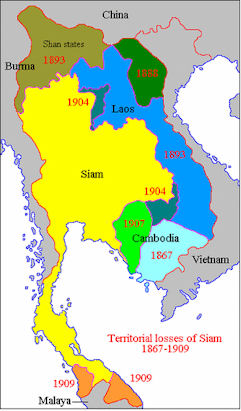

Zitierweise / cite as:
Payer, Alois <1944 - >: Chronik Thailands = กาลานุกรมสยามประเทศไทย. -- Chronik 2005 / B. E. 2548. -- 3. Juli bis Dezember. -- Fassung vom 2017-03-21. -- URL: http://www.payer.de/thailandchronik/chronik2005c.htm
Erstmals publiziert: 2012-11-05
Überarbeitungen: 2017-03-21 [Ergänzungen] ; 2016-03-25 [Ergänzungen] ; 2016-03-17 [Ergänzungen] ; 2015-06-07 [Ergänzungen] ; 2015-04-05 [Ergänzungen] ; 2014-11-25 [Ergänzungen] ; 2014-11-03 [Ergänzungen] ; 2014-08-22 [Ergänzungen] ; 2014-08-13 [Ergänzungen] ; 2013-09-27 [Ergänzungen] ; 2013-05-25 [Ergänzungen] ; 2013-04-29 [Ergänzungen] ; 2013-04-25 [Ergänzungen und Teilung des Jahrgangs]; 2013-04-20 [Ergänzungen]; 2013-04-14 [Ergänzungen]; 2013-04-09 [Ergänzungen]; 2013-04-05 [Ergänzungen]; 2013-03-31 [Ergänzungen]; 2013-03-27 [Ergänzungen]; 2013-03-22 [Ergänzungen]; 2013-03-18 [Ergänzungen]; 2013-03-15 [Ergänzungen]; 2013-03-09 [Ergänzungen]; 2013-02-21 [Ergänzungen]; 2013-02-16 [Ergänzungen]; 2013-02-13 [Ergänzungen]; 2013-01-26 [Ergänzungen]; 2013-01-13 [Ergänzungen]; 2012-11-09 [Ergänzungen]
©opyright: Dieser Text steht der Allgemeinheit zur Verfügung. Eine Verwertung in Publikationen, die über übliche Zitate hinausgeht, bedarf der ausdrücklichen Genehmigung des Herausgebers.
Dieser Text ist Teil der Abteilung
Thailand von
Tüpfli's Global Village Library
ช้างตายทั้งตัวเอาใบบัวปิดไม่มิด
|
Gewidmet meiner lieben Frau Margarete Payer die seit unserem ersten Besuch in Thailand 1974 mit mir die Liebe zu den und die Sorge um die Bewohner Thailands teilt. |
|
Bei thailändischen Statistiken muss man mit allen Fehlerquellen rechnen, die in folgendem Werk beschrieben sind:
Die Statistikdiagramme geben also meistens eher qualitative als korrekte quantitative Beziehungen wieder.
|
2005-07
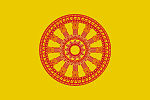
Han Raksasit (หาญ รักษาจิตร์, aka. Nen Ae - เณร แอ) wird wegen Betrugs verhaftet, da er jungen Frauen versprochen hat, seine Liebesmedizin und Sex mit ihm brächte ihnen ihre untreuen Ehemänner oder Liebhaber zurück. Die Polizei beschlagnahmt in seinem Haus und Schrein in der Provinz Saraburi einen Mercedes Benz sowie zwei weitere Luxusautos sowie auf seinen Bankkonten über 1 Million Baht.
Nen Ae war 1995-07 aus dem buddhistischen Orden vertrieben und zu sechs Monaten Gefängnis verurteilt worden wegen Betrugs mit einem magischen Öl, das er aus dem Leichnam eines Kindes gewonnen hatte. Den Leichnam soll er in einem Tempel gestohlen haben. Aus dem Öl machte er Amulette.
2005-07-07
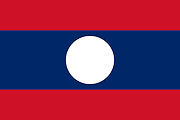
Thailand will 6.558 Hmong-Flüchtlinge (ชาวม้ง) nach Laos abschieben.
Abb.: Hmong-Dorf Long Tieng, Laos mit CIA-Luftlandeplatz LS-20A, 1974
[Bildquelle: Garry Jenkin. -- http://www.flickr.com/photos/grjenkin/100192443/. -- Zugriff am 2012-01-07. -- Creative Commons Lizenz (Namensnennung)]
Abb.: Lage von Long Tieng, Laos
[Bildquelle: OpenStreetMap. -- Creative Commons Lizenz (Namensnennung, share alike)]
"Controversy over repatriation In 1989, the UNHCR, with the support of the United States government, instituted the Comprehensive Plan of Action, a program to stem the tide of Indochinese refugees from Laos, Vietnam, and Cambodia. Under the plan, the status of the refugees was to be evaluated through a screening process. Recognized asylum seekers were to be given resettlement opportunities, while the remaining refugees were to be repatriated under guarantee of safety.
After talks with the UNHCR and the Thai government, Laos agreed to repatriate the 60,000 Lao refugees living in Thailand, including several thousand Hmong people. Very few of the Lao refugees, however, were willing to return voluntarily. Pressure to resettle the refugees grew as the Thai government worked to close its remaining refugee camps. While some Hmong people returned to Laos voluntarily, with development assistance from UNHCR, allegations of forced repatriation surfaced. Of those Hmong who did return to Laos, some quickly escaped back to Thailand, describing discrimination and brutal treatment at the hands of Lao authorities.
In 1993, Vue Mai, a former Hmong soldier who had been recruited by the U.S. Embassy in Bangkok to return to Laos as proof of the repatriation program's success, disappeared in Vientiane. According to the U.S. Committee for Refugees, he was arrested by Lao security forces and was never seen again.
Following the Vue Mai incident, debate over the Hmong's planned repatriation to Laos intensified greatly, especially in the U.S., where it drew strong opposition from many American conservatives and some human rights advocates. In an October 23, 1995 National Review article, Michael Johns, the former Heritage Foundation foreign policy expert and Republican White House aide, labeled the Hmong's repatriation a Clinton administration "betrayal," describing the Hmong as a people "who have spilled their blood in defense of American geopolitical interests." Debate on the issue escalated quickly. In an effort to halt the planned repatriation, the Republican-led U.S. Senate and U.S. House of Representatives both appropriated funds for the remaining Thailand-based Hmong to be immediately resettled in the U.S.; Clinton, however, responded by promising a veto of the legislation.
In their opposition of the repatriation plans, Republicans also challenged the Clinton administration's position that the Laotian government was not systematically violating Hmong human rights. U.S. Representative Steve Gunderson (R-WI), for instance, told a Hmong gathering: "I do not enjoy standing up and saying to my government that you are not telling the truth, but if that is necessary to defend truth and justice, I will do that." Republicans also called several Congressional hearings on alleged persecution of the Hmong in Laos in an apparent attempt to generate further support for their opposition to the Hmong's repatriation to Laos.
Although some accusations of forced repatriation were denied, thousands of Hmong people refused to return to Laos. In 1996, as the deadline for the closure of Thai refugee camps approached, and under mounting political pressure, the U.S. agreed to resettle Hmong refugees who passed a new screening process. Around 5,000 Hmong people who were not resettled at the time of the camp closures sought asylum at Wat Tham Krabok (วัดถ้ำกระบอก), a Buddhist monastery in central Thailand where more than 10,000 Hmong refugees were already living. The Thai government attempted to repatriate these refugees, but the Wat Tham Krabok Hmong refused to leave and the Lao government refused to accept them, claiming they were involved in the illegal drug trade and were of non-Lao origin.
Abb.: Lage von Wat Tham Krabok (วัดถ้ำกระบอก)
[Bildquelle: OpenStreetMap. -- Creative Commons Lizenz (Namensnennung, share alike)]In 2003, following threats of forcible removal by the Thai government, the U.S., in a significant victory for the Hmong, agreed to accept 15,000 of the refugees. Several thousand Hmong people, fearing forced repatriation to Laos if they were not accepted for resettlement in the U.S., fled the camp to live elsewhere within Thailand where a sizable Hmong population has been present since the 19th-century.
Abb.: Lage der Provinz Phetchabun (เพชรบูรณ์)
[Bildquelle: OpenStreetMap. -- Creative Commons Lizenz (Namensnennung, share alike)]In 2004 and 2005, thousands of Hmong fled from the jungles of Laos to a temporary refugee camp in the Thai province of Phetchabun (เพชรบูรณ์). These Hmong refugees, many of whom are descendants of the former-CIA Secret Army and their relatives, claim that they have been attacked by both the Lao and Vietnamese military forces operating inside Laos as recently as June 2006. The refugees claim that attacks against them have continued almost unabated since the war officially ended in 1975, and have become more intense in recent years.
Lending further support to earlier claims that the government of Laos was persecuting the Hmong, filmmaker Rebecca Sommer documented first-hand accounts in her documentary, Hunted Like Animals, and in a comprehensive report which includes summaries of claims made by the refugees and was submitted to the U.N. in May 2006.[56]
The European Union, UNHCHR, UNHCR, and international groups have since spoken out about the forced repatriation. The Thai foreign ministry has said that it will halt deportation of Hmong refugees held in Detention Centers Nong Khai (หนองคาย), while talks are underway to resettle them in Australia, Canada, the Netherlands and the United States.
For the time being, countries willing to resettle the refugees are hindered to proceed with immigration and settlement procedures because the Thai administration does not grant them access to the refugees. Plans to resettle additional Hmong refugees in the U.S. have been complicated by provisions of President Bush's Patriot Act and Real ID Act, under which Hmong veterans of the Secret War, who fought on the side of the United States, are classified as terrorists because of their historical involvement in armed conflict.
On December 27, 2009, the New York Times reported that the Thai military is preparing to forcibly return 4,000 Hmong asylum seekers to Laos by the end of the year: the BBC later reported that repatriations had started. Both United States and United Nations officials have protested this action. Outside government representatives have not been allowed to interview this group over the last three years. Médecins Sans Frontières has refused to assist the Hmong refugees because of what they have called "increasingly restrictive measures" taken by the Thai military. The Thai military jammed all cellular phone reception and disallowed any foreign journalists from the Hmong camps."
[Quelle: http://en.wikipedia.org/wiki/Hmong_people. -- Zugriff am 2012-01-07]
2005-07-12

US-Außenministerin Condoleezza Rice besucht das am 2004-12-26 zerstörte Dorf Ban Bang Sak (Provinz Phang Nga - พังงา), um zu zeigen, dass die USA "cares about Southeast Asia."
Abb.: Lage von Ban Bang Sak
[Bildquelle: OpenStreetMap. -- Creative Commons Lizenz (Namensnennung, share alike)]
Abb.: Condoleezza Rice kümmert sich um Südostasien
[Bildquelle: DonkeyHotey. -- http://www.flickr.com/photos/donkeyhotey/6324311721/. -- Zugriff am 2012-01-17. -- Creative Commons Lizenz (Namensnennung)]
2005-07-14
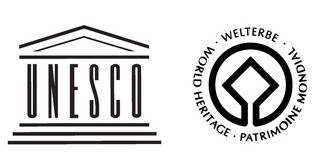
Die Bergkette Dong Phaya Yen (ป่าดงพญาเย็น) samt dem Khao-Yai-Nationalpark (อุทยานแห่งชาติเขาใหญ่) wird zum UNESCO-Weltnaturerbe ernannt.
Abb.: Lage von Dong Phaya Yen (ป่าดงพญาเย็น) und Khao-Yai-Nationalpark (อุทยานแห่งชาติเขาใหญ่ - auf Sankambeng Range)
[Bildquelle: Hdamm / Wikipedia. -- GNU FDLicense]
2005-07-14
Anschläge auf Transformatoren legen die Stromversorgung Yala's (ยะลา) lahm. Bombenanschläge in den dunklen (stromlosen) Straßen.
2005-07-16
พระราชกำหนด การบริหารราชการในสถานการณ์ฉุกเฉิน พ.ศ. ๒๕๔๘ (Emergency decree on public administration in state of emergency B.E. 2548)
" § 5Once it appears that a state of emergency does come to pass and the Prime Minister finds expedient to exercise the combined forces of the administrative or police officers, civil officers or military officers, for the sake of prevention, resolution, withholding, abatement or suppression of the situation, or rehabilitation of or providing of assistance to the people, the Prime Minister, with the approval of the Council of Ministers, may declare a state of emergency throughout the Kingdom or in certain parts thereof according to the necessity of the circumstances. In cases the approval of the Council of Ministers may not be obtained in time, the Prime Minister may declare a state of emergency and later seek for such approval within three days. Should such approval not be obtained within the time limit or should the Council of Ministers withhold its approval, the declaration of state of emergency shall come to an end.
The declaration of state of emergency under paragraph 1 shall be in force throughout a period of time designated by the Prime Minister, but not in excess of three months from its issuance. In case of necessity, the Prime Minister, with the approval of the Council of Ministers, may announce several successive extensions not exceeding three months each.
Upon cessation of the state of emergency, disapproval of the Council of Ministers, or termination of the period of time under paragraph 2, the Prime Minister shall lift the declaration of such state of emergency.
§ 6There shall be a State of Emergency Administration Board, consisting of: the Deputy Prime Minister designated by the Prime Minister as Chairperson; the Minister of Defence, the Minister of Interior and the Minister of Justice as Vice Chairpersons; the Permanent Secretary for Defence, the Permanent Secretary for Foreign Affairs, the Permanent Secretary for Social Development and Human Security, the Permanent Secretary for Interior, the Permanent Secretary for Justice, the Director of the National Intelligence Agency, the Attorney General, the Chief of the Defence Staff, the Chief of the Land Staff, the Chief of the Maritime Staff, the Chief of the Air Staff, the Chief of the National Police, the Director General of the Department of Provincial Administration and the Director General of the Department of Disaster Prevention and Mitigation as Members; and the Secretary General of the National Security Council as member and secretary. The Board shall be invested with the authority to pursue and examine the events occurring inside and outside the Nation and likely to give rise to a state of emergency, and to render to the Prime Minister an opinion as to whether a state of emergency under section 5 or serious state of emergency under section 11 should be declared and which of the measures under this Emergency Decree should be taken for the purpose of preventing, remedying or abating such state of emergency.
The provisions of this section shall not debar the Prime Minister from exercising his power under section 5 to declare a state of emergency in case of an urgent need to deal with an immediate danger against the Nation or its people.
§ 7In the area where a state of emergency is declared pursuant to section 5, all the existing legal authority vested in or taken charge of by one Minister or more, only in respect of the giving of approval, endorsement, instructions, commands or support as to the prevention, resolution, withholding, abatement or suppression of the state of emergency, or rehabilitation of or providing of assistance to the people, shall provisionally be transferred to the Prime Minister, for the sake of consistent, expeditious and efficacious administration and resolution of the situation.
The Council of Minister shall issue an announcement as to which existing legal authority vested in a Minister is to wholly or partially be transferred to the Prime Minister pursuant to paragraph 1.
The Prime Minister shall be empowered to appoint any person as a competent authority enforcing this Emergency Decree and carrying out any function transferred to the Prime Minister according to paragraph 1. It shall be taken that such competent authority is also competent under the law concerned. In this regard, the Prime Minister may authorise a government agency or competent authority under the law concerned to continue to exercise its existing authority, but subject to the criteria laid down by him.
In cases the Prime Minister appoints a civil, police or military officer ranking not lower than director general, police commissioner, military commander or its equivalent as a competent authority and chief officer in charge of the resolution of a state of emergency and of the government officers and competent authorities inside a specific area, the relevant government agencies and government officers, as well as the competent authorities, shall discharge their duties in conformance to the instructions of such chief officer; prescribed, however, that the military operations shall be subject to the regulations, rules or ordinances governing the exercise of military forces, and the guidance given by the chief officer.
In case of necessity, the Council of Ministers may set up a special agency to enforce this Emergency Decree until the declaration of the state of emergency is lifted.
The Prime Minister may authorise one Deputy Prime Minister or Minister or more to on his behalf exercise the authority under paragraph 1, 3 or 4, or to supervise the performance of duties of the relevant government agencies, competent authorities under paragraph 3, chief officers under paragraph 4 and agencies under paragraph 5. In this respect, the person so authorised shall be deemed as the commander of the chief officers, government agencies and competent authorities concerned.
§ 8In order that the cooperation on the performance of duties inside the area of the state of emergency be conducted appropriately and in line with the nature of the situation and the lives of the local people, the Prime Minister or his designee may authorise a group of persons or a person to render to the competent authorities the advices concerning or assistance in the enforcement of this Emergency Decree.
The persons authorised under paragraph 1 shall enjoy the same protection as the competent authorities, to the extent of their authorised functions.
§ 9In case of need to put an end the state of emergency without delay or to prevent the increase of its seriousness, the Prime Minister shall be invested with the power to lay down the following ordinances:
(1) A person is prohibited from staying outside his residence during a period of time indicated, save where the permission of a competent authority or the exemption is obtained;
(2) The meetings or gatherings at any place, or whatever acts giving rise to unrest are prohibited;
(3) The presentation, distribution or circulation of news, writings, printed materials or any other media the contents of which are likely to terrify the public, or are intentionally distorted with a view to bringing about a misunderstanding as to the state of emergency, to such an extent that the national security or public policy would be impaired, is prohibited, either inside the area of the state of emergency only or throughout the Kingdom;
(4) The use of any means of communication or any vehicle is prohibited or is subject to the conditions stipulated;
(5) The use, entry into or presence in any building or place is prohibited;
(6) The people are to be evacuated from an area indicated, for the sake of their safety, or no person is permitted to enter an area indicated.
The execution of any ordinance mentioned in paragraph 1 may be subject to a time clause. And in enforcing such ordinance, the competent authorities may be placed under certain conditions or may be authorised to specify the area and further details, so as to prevent the public from any immoderate difficulty.
§ 10For the purpose of promptly dealing with any problem inside the area of the state of emergency, the Prime Minister may authorise a competent authority designated as a chief officer under section 7, paragraph 4, to issue the ordinances under section 9 on his behalf. Upon their issuance, the ordinances must be referred to the Prime Minister without delay, and shall cease to be in force had they failed to be affirmed by the Prime Minister within forty eight hours from their issuance.
§ 11Where a state of emergency involves an act of terrorism, act of forcible violence against life, body or property, or reasonably suspected act of violence against the national security or safety in life or property of the State or private citizens, and certain measures need to be taken for the purpose of effectively and promptly put an end thereto, the Prime Minister, with the approval of the Council of Ministers, may declare such state of emergency as a serious state of emergency, and the provisions of sections 5 and 6, paragraph 2, shall mutatis mutandis apply.
Upon the declaration under paragraph 1, the Prime Minister shall, in addition to the power granted by sections 7, 8, 9 and 10, also be invested with the following power:
(1) To, by announcement, authorise a competent authority to arrest and restrain a person suspected of having taken part in the provocation of the state of emergency, being a principal, inciter or aider therein or thereof, or concealing certain information in connection therewith; prescribed that the arrest or restraint must be made only for the purpose of preventing the person in question from committing or partaking in any action likely to worsen the situation or extracting his cooperation on the abatement of the serious situation;
(2) To, by announcement, authorise a competent authority to direct any person to report to him or furnish him with any statement, document or evidence concerning the state of emergency;
(3) To, by announcement, authorise a competent authority to seize or attach any weapons, goods, consumption goods, chemical substances or other objects reasonably suspected of having been used or being likely to be used for the provocation of the state of emergency or aid therein;
(4) To, by announcement, authorise a competent authority to search, disassemble, remove or destroy any building, structure or barrier to the extent necessary for the implementation of his duty to straightaway put an end to the serious situation, unless the prompt resolution thereof would be unsuccessful;
(5) To, by announcement, authorise a competent authority to censor the communication through letters, writings, printed materials, telegraphs, telephones or by any other means, as well as to suppress or suspend any kind of contact or communication, for the purpose of preventing or abating the serious situation; prescribed that the criteria under the law on special investigation shall mutatis mutandis apply;
(6) To, by announcement, direct any act to be withheld or to be carried out, to the extent necessary for the maintenance of national security, national safety or popular safety;
(7) To, by announcement, authorise a competent authority to debar any person from leaving the Kingdom, upon a reasonable belief that it would affect the national security or safety;
(8) To, by announcement, authorise a competent authority to remove an alien from the Kingdom, upon a reasonable belief that he aids in the provocation of the serious situation; prescribed that the law on immigration shall mutatis mutandis apply;
(9) To, by announcement, require the buy, sale, use or possession of any weapon, goods, medical goods, consumption goods, chemical substance or other appliance likely to be employed in the provocation of unrest or commission of an act of terrorism to be referred to or permitted by a competent authority, or to be subject to the conditions laid down by the Prime Minister;
(10) To, by announcement, direct the military forces to assist the administrative or police officers in abating the serious situation or restoring the order without delay; prescribed that in executing their duty, the military officers shall enjoy the same authority as the competent authorities under this Emergency Decree, and that the exercise of military forces shall be under the conditions and time clauses determined by the Prime Minister and shall not exceed the point subject to the Martial Law.
Upon cessation of the serious situation under paragraph 1, the Prime Minister shall without delay cancel the announcements issued in virtue of this section.
§ 12So as to arrest and restrain any suspect pursuant to the announcement under section 11 (1), the competent authority shall seek for the permission of the jurisdictional court or Criminal Court. Upon such approval, the competent authority may arrest and restrain the suspect for not more than seven days; required that the restraint must be held in a designated place not being a police station, detention chamber, prison or penal institution, and that the suspect may not be treated as an offender. In cases the restraint needs to be continued for the sake of the resolution of the state of emergency, the competent authority shall request the court for several successive extensions not exceeding seven days each; prescribed, however, that the total extended period of restraint may not be in excess of thirty days. If such time limit does expire but the restraint is still required, the Code of the Criminal Procedure shall then be proceeded with.
In carrying out the proceedings under paragraph 1, the competent officer shall submit to the court granting the permission a record of arrest and restraint. He shall also make available at his office a copy of such record, in order that the relatives of the person restrained would be able to inspect it at any time in the course of the restraint.
The provisions of the Code of Criminal Procedure on application for criminal warrant shall mutatis mutandis apply to the seeking for judicial permission mentioned in paragraph 1.
§ 13Should a thing or appliance announced according to section 11 (9) be a communication device or part thereof, the Prime Minister may also have the announcement effective throughout the Kingdom or over the localities not subject to the declaration of the state of emergency.
§ 14Upon their entry into operation, the ordinances, announcements and orders referred to in sections 5, 7, 8, 9, 11 and 15, shall be published in the Government Gazette.
§ 15The competent authorities under this Emergency Decree or persons invested with the same authority as them shall become the public officers under the Criminal Code and, to the extent determined by the Prime Minister, shall enjoy the authority of administrative or police officer under the Code of Criminal Procedure.
§ 16The ordinances, announcements, orders or actions under this Emergency Decree shall not be subject to the law on administrative procedure and the law on establishment of administrative courts and procedure thereof.
§ 17The competent authorities under this Emergency Decree or persons invested with the same authority as them shall incur no civil, criminal or disciplinary liability for their performance of duties to suppress or prevent any unlawful act, if such performance is rendered in good faith, does not give rise to discrimination and does not exceed the reasonability or necessity of the circumstances, without prejudice to the right of the victims to claim damages from the public sector pursuant to the law on tortuous liability of authorities.
§ 18Any person who contravenes any ordinance, announcement or order given by virtue of section 9, 10, 11 or 13, shall be liable to imprisonment for not more than two years, or a fine not exceeding forty thousand baht or both.
§ 19The Prime Minister shall be in charge of this Emergency Decree."
[Übersetzung: https://en.wikisource.org/wiki/Emergency_Decree_on_Public_Administration_in_State_of_Emergency,_BE_2548_%282005%29. -- Zugriff am 2016-03-16]
Die Regierung erklärt Notstandsrecht über die südlichsten Provinzen (Yala - ยะลา, Pattani - ปัตตานี, Narathiwat - นราธิวาส). Das gibt dem Militär fast unbeschränkte Rechte.
Abb.: Provinzen unter Notstandsrecht
[Bildquelle: CIA. -- Public domain]
2005-07-17
Erste Nummer des Thai-Manga EXEcutional (เอ็กซีคิวชั่นแนล).
Abb.: EXEcutional (เอ็กซีคิวชั่นแนล)
[Bildquelle: Wikipedia. -- Fair use]
"EXEcutional (Thai: เอ็กซีคิวชั่นแนล Èk See Kiw Chân-Naen) is a Thai language comic book written by Panuwat Wattananukul (Thai: ภานุวัฒน์ วัฒนนุกูล). The comic is serialized in the Thai version of Weekly Shōnen Jump (週刊少年ジャンプ), C-Kids (ซีคิดส์). Introduction
The story takes place in an online game called "Neo Universe," which has 7,000,000 people around the world participating. Players can participate via headphone; neither keyboard nor joystick are needed. The players connect a headphone to the game hardware and close their eyes; they enter the game automatically, controlling the game through their minds. Although this sounds dangerous, the game administrator guarantees that it is safe. The game became popular in a short period of time, with the number of players increasing daily.
Ganda (กานดา), a boy protagonist, is one of the players. The story focuses on the war between the game-masters (GM) group and the anti-game-masters group, to which Ganda belongs. The story also touches on how Ganda and his friends are doing and their relationship in the real world. Unlike other online games in which players are separated into different servers, Neo-Universe keeps all 7,000,000 players in one server. In the game, there are four planets on which the players live:
- Laputa: The planet on which Ganda and his friends; the story takes place primarily here
- Vertex: A mysterious planet, full of monsters and dangers
- Reticulum: The planet with the largest trading and marketing area
- Muera: The planet with abundant ores, and with more-advanced technology compared with the other planets
There are thousands of weapons, items and jobs in the game. Cliched professions from other role-playing games such as magician, knight, or healer are rare in this game. Instead, there are unconventional jobs assigned to each player, ranging from randomizer to princess.[1] The game is expansive; there is much data for readers to discover.
PlotNeo Universe was an online game popular in the story. Ganda participated in the game, hoping to become a GM like his brother Vissana. However, Ganda was tricked by an anti-GM member named Waipoj, and became one of the anti-GM members. He learned later that the anti-GMs were not evil, as he thought. The real evil were the GM members themselves, since they could kill any player for their own purposes. The anti-GM group was the only group brave enough to challenge them, and it became an army with the addition of allies.
Ganda (accompanied by Passorn, a kind girl; Waipoj, a wily person; Mr. Rabbit, a muscular quasi-person with a rabbit head; Majsha, the leader; Assada and Kasem) helped to complete the assigned missions. He also made new friends in the game, such as Mint (an active girl who helped Ganda with investment and fighting the Eric Herb Company). The climax of part one was the battle between the anti-GMs and the GMs in the Winchester War, in which Ganda fought his brother Vissana. The winner was the anti-GM army, which drove the GMs away."
[Quelle: http://en.wikipedia.org/wiki/EXEcutional. -- Zugriff am 2012-03-05]
2005-07-20

10.000 Mönche, Mae Chi (แม่ชี), Studenten und Sozialaktivisten protestieren dagegen, dass ThaiBev (ไทยเบฟ) an der Börse SET (ตลาดหลักทรัพย์แห่งประเทศไทย) notiert werden soll. ThaiBev ist der Hersteller u.a. von Chang-Bier (เบียร์ช้าง) und Mekong-Whisky (แม่โขง).
Abb.: ®Logo
[Bildquelle: Wikipedia]
"Thai Beverage (ThaiBev, Thai: ไทยเบฟ) is Thailand's largest and one of the largest beverage alcohol companies in South East Asia with distilleries in Thailand, Scotland, Poland, Ireland, China, and France. Listed on the Singapore Stock Exchange, Thai Beverage Plc has a market capitalisation in excess of US$4bn. Thai Beverage Public Company Limited owns and distributes a number of significant brands including Chang beer and Mekhong and Sang Som rum (แสงโสม). It also has significant operations in Europe producing malt Scotch whisky, vodkas, gins, and liqueurs with over 20 distilleries in Scotland, France, Poland, and Ireland.
Chang Beer, which first started production in March 1995 at the brewery in the district of Bang Ban, Ayutthaya Province, is the top-selling brand in Thailand. It managed to win 60% of market share in Thailand after a hard market fight with the previously biggest brand Singha (สิงห์). In 2006, the company's market share was 49% of the beer market, according to research company Canadean."
[Quelle: http://en.wikipedia.org/wiki/ThaiBev. -- Zugriff am 2012-01-07]
2005-07-21

China löst seine Währung - Renminbi (人民币 = 元) - von der strengen Bindung an den US-Dollar und wertet sie um 2,05% gegenüber dem Dollar auf.
"Im Juli 2005 reagierte die Zentralbank auf den Druck der Märkte und ließ den Renminbi leicht um 2,1 % aufwerten. Für die Zukunft kündigte die Bank einen Übergang zu einem Währungskorb-System an. Nach ersten Verlautbarungen des Gouverneurs der Zentralbank Zhou Xiaochuan vom August 2005 soll der Währungskorb mehr als zehn Währungen enthalten, vor allem US-Dollar, Euro, japanischen Yen und südkoreanischen Won. Allerdings ist nach wie vor eine sehr starke Fokussierung auf den US-Dollar zu beobachten. Seit der Lösung der vollkommen festen Bindung wurde der Renminbi bis Juli 2007 um etwa 9 % aufgewertet. 2007 wurde der Renminbi um weitere 6 % gegenüber dem Dollar aufgewertet, gleichzeitig um ebenfalls 6 % gegenüber dem Euro abgewertet, da der Euro je Dollar um 12 % zulegen konnte. Das chinesische Wechselkursregime 2007 entsprach ungefähr einem Währungskorb mit gleich großer Gewichtung von Dollar und Euro." [Quelle: http://de.wikipedia.org/wiki/Renminbi. -- Zugriff am 2012-01-03]
2005-07-26
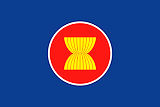
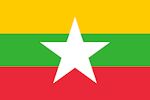
Myanmar verzichtet auf den turnusgemäßen Vorsitz in ASEAN im Jahr 2006. Damit wird verhindert, dass westliche Staaten ASEAN-Treffen boykottieren.
2005-07-29
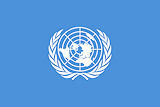
Der UNO-Sicherheitsrat definiert in einer Resolution, wer als Förderer des Terrorismus anzusehen ist. Die Staaten sind verpflichtet, gegen jeden vorzugehen, der Terroristen rekrutiert, ihnen Unterschlupf gewährt oder an sie Waffen verkauft.
2005-07-30

Bangkok Post:
Abb.: Lage der Provinz Narathiwat [นราธิวาส]
[Bildquelle: OpenStreetMap. -- Creative Commons Lizenz (Namensnennung, share alike)]
"Many markets and shops in Narathiwat [นราธิวาส] province were shuttered yesterday after militants distributed leaflets demanding that the Islamic holy day be observed as a day of prayer. Despite the security beef-up, Buddhist and Muslim traders in several districts in Narathiwat closed their shops as they feared they might be killed if they ignored the insurgents’ demand. About 90% of shops and markets in several areas were closed. Leaflets have been distributed in 13 districts in the province two weeks ago ordering that Friday be observed as a day of prayer. All activities must be stopped, the leaflet said. Those who failed to heed the demand would face threats to their lives."
[Zitiert in: Anderson, Wanni W. (Wanni Wibulswasdi) <1937 - >: Mapping Thai Muslims : community dynamics and change on the Andaman Coast. -- Chiang Mai : Silkworm, 2010. -- 185 S. : Ill. ; 21 cm. -- ISBN 9789749511923. -- S. 115f. -- Fair use]
2005-08
Abb.: Kathoeys (กะเทย), Bangkok, 2004
[Bildquelle: AxelBoldt / Wikipedia. -- Public domain]
"Nach einer Klage von Samart Meecharoen, der seinen Job verloren hatte, bekommen Homosexuelle und Kathoeys (กะเทย) auch beim Militär nicht mehr den Vermerk „Hat Geistesstörung” in den Musterungsbescheid. Dies wurde im August 2005 beschlossen und war damit erstmals zur Musterung ab April 2006 wirksam. Vor allem weiblich agierenden Männern werden jedoch „Probleme mit der sexuellen Identität” bescheinigt und sie sind vom Militärdienst ausgeschlossen. Davor jedoch wurden alle jungen Männer zum Militärdienst berufen, außer Homosexuelle und Transsexuelle, die wegen „psychischer Verwirrungen” ausgeschlossen wurden." [Quelle: http://de.wikipedia.org/wiki/Homosexualit%C3%A4t_in_Thailand. -- Zugriff am 2012-06-18]
2005-08 - 2008-10

Christoph Brümmer (1943 - ) ist deutscher Botschafter in Thailand.
2005-08-01
Jon Ungphakorn (จอน อึ๊งภากรณ์, 1942 - ) erhält in Manila den Ramon Magsaysay Award for Government Service.
Abb.: ®Ramon Magsaysay Award
[Bildquelle: Wikipedia. -- Fair use]
Abb.: Lage von Manila
[Bildquelle: OpenStreetMap. -- Creative Commons Lizenz (Namensnennung, share alike)]
Abb.: Jon Ungphakorn (จอน อึ๊งภากรณ์)
[Bildquelle: http://www.rmaf.org.ph/Awardees/Biography/pdfbio/UngphakornJon.pdf. -- Zugriff am 2012-01-07. -- Fair use]
"For much of the twentieth century, Thailand was led by military men as governments shifted coup after coup. Even so, democracy slowly took hold. A new constitution in 1997 enshrined civilian governance and popular representation through elections. The kingdom’s democratic transition now seems complete. Yet today, democracy and "money politics" have created a new power matrix in Thailand. "We have never had a government with such authority and power," says Senator Jon Ungphakorn, noting that the voices of many Thai citizens remain unheard. As a member of Thailand’s upper house, he is raising those voices. Born in London in 1947, Ungphakorn trained as an engineer in England but made his life in Thailand, where his father, Puey Ungphakorn (ป๋วย อึ๊งภากรณ์, 1916 - 1999), was an enlightened architect of the modern Thai state and an early Magsaysay Awardee. Jon began his own career as a lecturer at Mahidol University (มหาวิทยาลัยมหิดล) but, in the politically turbulent 1970s, turned his attention to social issues. In 1980 he founded the Thai Volunteer Service to expose privileged university graduates to the country’s rural poor and to the nongovernmental organizations (NGOs) that were working among them. Ungphakorn helped the new NGOs to manage and fund their projects and, as he did so, played a key role in knitting Thailand’s nascent civil society together.
Responding early to the presence of HIV/AIDS in Thailand, in 1991 Ungphakorn founded the AIDS-Access Foundation (มูลนิธิเข้าถึงเอดส์). He pioneered in providing confidential counseling for people with HIV/AIDS and their families, in fighting the public stigma of AIDS, and in asserting the rights of everyone to effective and affordable treatment. As chair of the NGO Coalition on AIDS (คณะกรรมการองค์การพัฒนาเอกชนด้านเอดส์), he fostered collaboration and helped build an effective network for advocacy.
When Thailand’s new constitution opened the Senate to election in 2000, Ungphakorn mobilized supporters from the NGO and HIV/AIDS communities and won a seat. He says frankly that "No one listens to NGOs, but if you are elected senator . . . everyone is interested."
The Thai Senate (วุฒิสภาไทย) does not initiate legislation but plays an important role in monitoring government and shaping the country’s laws. As a member of the Health Committee and the Social Development and Human Security Committee, Ungphakorn used his position to advance the concerns of Thailand’s marginalized citizens, making shrewd use of the press to publicize critical committee findings that might otherwise have been shelved or buried in the slow-moving legislative process. As he did so, Ungphakorn prioritized Thailand’s HIV/AIDS community—by working to include HIV/AIDS patients in the country’s new "30-baht-per-visit" national health scheme; by supporting the lawsuit against Bristol-Myers Squibb that opened the door for Thailand to produce a critical anti-HIV drug at half the cost; and by prevailing upon the government to ban a food supplement being callously advertised as an AIDS miracle drug.
But Ungphakorn has also used his senatorial authority to expose the brutal hand of the government toward Muslim communities in southern Thailand, and to uphold the rights of rural folk whose livelihoods are threatened by property speculators and scandal-ridden dams, power plants, and mines. He has inveighed against the death penalty, against intellectual-property-rights agreements that disadvantage poor Thais, and against a national press that has failed, he says, to report "violence perpetrated by the state apparatus [and] the violation of human rights."
Ungphakorn is not alone in pressing these concerns. But he and his like-minded senators are in a minority. Most senators bow to the government, he says. But Ungphakorn knows that his constituency and his heart lie elsewhere. "I was elected by NGOs and the HIV/AIDS community," he says. "They set the agenda. I give them support."
In electing Jon Ungphakorn to receive the 2005 Ramon Magsaysay Award for Government Service, the board of trustees recognizes his impassioned insistence as a senator that Thailand respect the rights and attend humanely to the needs of its least advantaged citizens."
[Quelle: http://www.rmaf.org.ph/Awardees/Citation/CitationUngphakornJon.htm. -- Zugriff am 2012-01-07]
2005-08-01
Tod der Sängerin Srisuda Tarchatawan (ศรีสุดา รัชตะวรรณ, geb. 1930). Sie war Mitglied des Suntharaphon Orchesters (สุนทราภรณ์)
Die Gruppe auf Spotify:
URI:
spotify:artist:7lY1SCRs9bOLSZaaIjdZHT
URL:
https://open.spotify.com/artist/7lY1SCRs9bOLSZaaIjdZHT
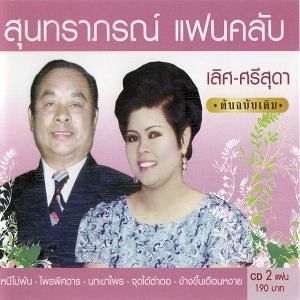
Abb.:
CD-Titel
[Fair use]
2005-08-05
Gen Sonthi Boonyaratkalin (พลเอก สนธิ บุณยรัตกลิน, 1946 - ) wird zum Armeechef ernannt. Er ist der erste Muslim auf diesem Posten.
Abb.: Gen Sonthi Boonyaratkalin (พลเอก สนธิ บุณยรัตกลิน), 2009
[Bildquelle: The Official Site of The Prime Minister of Thailand Photo by พีรพัฒน์ วิมลรังครัตน์. -- http://www.flickr.com/photos/40561337@N07/3874683889/. -- Zugriff am 2012-01-07. -- Creative Commons Lizenz (Namensnennung)]
"General Sonthi Boonyaratkalin (Thai: สนธิ บุณยรัตกลิน, Aussprache: [sǒntʰíʔ bunjárátkàlin]; auch Sondhi Boonyaratglin; * 2. Oktober 1946 in Bangkok) war seit 2005 Kommandant der thailändischen Landstreitkräfte. Am 19. September 2006 war er Anführer der Putschisten gegen die Regierung von Premierminister Thaksin Shinawatra (ทักษิณ ชินวัตร). Er war seit dem 15. Oktober 2007 als stellvertretender Premierminister Teil der vom Militär eingesetzten zivilen Übergangsregierung. Leben
Sonthi Boonyaratkalin wurde als Nachkomme einer angesehenen Familie in Bangkok geboren. Unter seinen männlichen Vorfahren befand sich der erste höchste moslemische Geistliche Thailands. Seine Mutter war Kammerfrau im Königspalast.
1969 schloss er die Königliche Militärakademie (โรงเรียนนายร้อยพระจุลจอมเกล้า) ab und setzte seine militärische Ausbildung in den USA fort. Als Offizier der thailändischen Armee, schon früher mit dem Kommando für besondere Kriegsführung betraut, wurde er 2005 als erster Muslim des überwiegend buddhistischen Landes zum Oberkommandierenden der Streitkräfte ernannt. Dies wurde allgemein als Zeichen an Aufständische im Süden des Landes gewertet, wo es seit Jahrzehnten zu gewalttätigen Konfrontationen zwischen nach Autonomie strebenden muslimischen Gruppen und dem Militär kommt. Sonthi versuchte eine Verhandlungslösung in diesem Konflikt herbeizuführen, scheiterte damit aber an der Weigerung Premierminister Thaksins, der Verhandlungen mit den Aufständischen ablehnte.
Er gilt als Vertrauter des Königs und war mehrmals durch Auseinandersetzungen mit Thaksin Shinawatra über sicherheitspolitische Fragen aufgefallen.
Am 19. September 2006 stand er an der Spitze des unblutig verlaufenen Militärputsches, durch den der Premierminister abgesetzt werden sollte. Von den Vertretern des Militärs wurde er am 20. September als vorläufiger amtierender Regierungschef bestimmt. Der König, der in Thailand das weitgehend uneingeschränkte Vertrauen der Bevölkerung genießt, bestätigte in einer im Fernsehen übertragenen Rede, dass Sonthi Vorsitzender des neuen Rates für demokratische Reformen (คณะปฏิรูปการปกครองในระบอบประชาธิปไตย อันมีพระมหากษัตริย์ทรงเป็นประมุข) sei. Er forderte die Bevölkerung auf, „alle Menschen sollten friedlich bleiben und die Beamten sollten von jetzt an auf die Anweisung von General Sonthi hören“.
Am 1. Oktober 2006 wurde Sonthi als Regierungschef von dem Chef der zivilen, durch das Militär eingesetzten Übergangsregierung, Surayud Chulanont abgelöst (สุรยุทธ จุลานนท์). Der Rat für demokratische Reformen blieb aber weiterhin unter Sonthis Vorsitz als übergeordnete Instanz bestehen.
Am 30. September 2007 ging Sonthi als Oberbefehlshaber der Streitkräfte in den Ruhestand. Am 1. Oktober 2007 erklärte er seinen Rücktritt als Vorsitzender des Rates für nationale Sicherheit (คณะมนตรีความมั่นคงแห่งชาติ). Am 15. Oktober 2007 wurde er daraufhin zum stellvertretenden Premierminister ernannt.
Im November 2009 übernahm er den Vorsitz der muslimischen Matubhum-Partei (พรรคมาตุภูมิ, Mutterlandpartei).
Obwohl im Rahmen der Thaiifizierungsgesetze in Thailand auch für Muslime die Monogamie vorgeschrieben ist, lebt Sonthi mit drei Ehefrauen (Sukunya - สุกัญญา, Piyada - ปิยะดา, Wanna - วรรณา) zusammen. Mit zwei von ihnen (Sukunya, Piyada) ist er offiziell gleichzeitig verheiratet."
[Quelle: http://de.wikipedia.org/wiki/Sonthi_Boonyaratglin. -- Zugriff am 2012-01-07]
2005-08-08
The Nation: Cracking up the egg emperor / von Kreangsak Suwanpantakul
Abb.: Thongchai Prasongsanti (ธงชัย ประสงค์สันติ), 2008
[Bildquelle: Looknarm / Wikimedia. -- GNU FDLicense]
"The success of Thongchai [Prasongsanti - ธงชัย ประสงค์สันติ, 1963 - ] and his show adds to the evidence that this is the Isaan [อีสาน] era. Tony Jaa [โทนี่ จา, 1976 - ] has been ferried to global stardom by the breakaway film hit Ong Bak [องค์บาก, 2003] and is doing lunch with Jackie Chan [] 成龍, 1954 - ]. Comedian Petchtai "Mum Jokmok" Wongkhamlao [เพ็ชรทาย "หม่ำ จ๊กม๊ก" วงศ์คำเหลา, 1965 - ] and singer Jintara Poonlarb [จินตหรา พูนลาภ, 1971 - ] are currently riding high nationally.
They re all from Isaan, the region that s so often unfairly depicted as a drought-ridden, dirt-poor place whose country-bumpkin, locust-munching citizens form the core of the country s labour force.
We re very hard-working and patient people, says Thongchai, 42. Our lives are portrayed in a lot of songs. It s part of life s education. I m not offended [by disparaging remarks] and very proud.
Do you speak the Isaan dialect? he asks. Coming from Korat (Nakhon Ratchasima) [โคราช / นครราชสีมา] and with parents from Maha Sarakham [มหาสารคาม] province, Thongchai is fluent in both the Isaan and Korat dialects.
Isaan natives are like people of African descent, he says.
We re both discriminated against over race and colour, but what we have in common is a love of music and the ability to work hard."
Abb.: Lage von Korat (Nakhon Ratchasima) [โคราช / นครราชสีมา] und Maha Sarakham [มหาสารคาม]
[Bildquelle: CIA. -- Public domain]
2005-08-11
Premiere des Films Revenge of the Warrior – Tom Yum Goong (ต้มยำกุ้ง) von Prachya Pinkaew (ปรัชญา ปิ่นแก้ว, 1962 - )
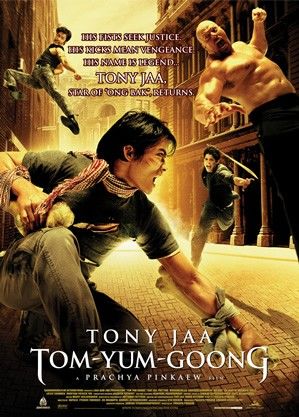
Abb.: Plakat
[Bildquelle: Wikipedia. -- Fair use]
|
"Revenge of the Warrior – Tom Yum Goong (Thai: ต้มยำกุ้ง, Aussprache: [tôm jam kûŋ], engl.: Tom Yum Goong) ist ein thailändischer Martial-Arts-Spielfilm aus dem Jahr 2005 von dem Regisseur Prachya Pinkaew (ปรัชญา ปิ่นแก้ว, 1962 - ) mit Tony Jaa (โทนี่ จา, 1976 - ) in der Hauptrolle. HandlungKham (ขาม), letzter Nachkomme einer Ahnenkette von Kriegern, die mit Kriegselefanten in ein Gefecht zogen, lebt mit seinem Vater und einer Elefantenfamilie friedlich in einem Dorf irgendwo in Thailand. Eines Tages dringen Wilderer in das idyllische Dorf ein und versuchen das Elefantenbaby Korn einzufangen, werden aber von der Elefantenkuh überrascht, die ihr Kalb schützen will. Die Eindringlinge erschießen daraufhin die Elefantenmutter. Ohne Beute gelingt der Bande die Flucht. Khams Vater will den Elefantenbullen Por Yai auf einem Jahrmarkt einer königlichen Prüfung unterziehen, um festzustellen, ob dieser sich eignet, dem König von Thailand als Geschenk zu dienen. Der Elefantenbulle wird positiv getestet und eingezogen, woraufhin der Alte misstrauisch wird. Als er schließlich merkt, dass es sich um die bekannten Wilderer handelt, wird er von der Bande angeschossen, die neben dem Bullen auch noch das Elefantenkalb entführt. Kham, der die zwei Dickhäuter als Teil seiner Familie ansieht, erfährt, dass seine Tiere von einem gewissen Johnny nach Sydney in Australien verschleppt worden sind, dem er dahin folgt. In Sydney angekommen wird er kurze Zeit später Zeuge eines Mordes an einem gesuchten Verbrecher, der ihn als Taxifahrer chauffierte. Sergeant Mark, ein aus Thailand stammender Polizist, nimmt Kham daraufhin fest, um ihn später zu verhören. Im Polizeiwagen sieht Kham zufällig Johnny, der als Geschäftsführer des Edelrestaurants Tom Yum Goong (ต้มยำกุ้ง) mitten im asiatischen Viertel von Sydney arbeitet. Er flieht daraufhin aus dem Polizeigewahrsam, um Johnny aufzusuchen. Bald kann er ihn stellen, aber dank unzähliger Kampfhandlungen entkommt dieser. Hierbei wird Kham verletzt und die aus Thailand stammende Prostituierte Pla (ปลา) nimmt ihn in ihrer Wohnung auf. Unterdessen wird er als Tatverdächtiger von der Polizei und von der Verbrecherin Madame Rose, der Drahtzieherin für die Entführung der Elefanten, gesucht. Sergeant Mark, der sich ebenfalls als unbequem für Madame Rose erweist, wird von seinem Vorgesetzten Vincent, der mit Madame Rose sympathisiert, in eine Falle gelockt, doch ihm gelingt vorerst die Flucht. Ihm sollen mehrere Morde angehängt werden, darunter einer am obersten Polizeichef Sydneys. Pla wird zufällig Zeugin der Tat und sichert sich eine Videoaufnahme, die Marks Unschuld beweist. Mark wird fortan polizeilich gesucht und gerät erneut in eine Falle, wo er von Johnny dingfest gemacht wird. Von Pla erfährt Kham, dass Johnny und seine Gang von dem Restaurant Tom Yum Goong aus operieren. Nachdem er sich im Restaurant den Weg zu Johnny freikämpft, ihn später besiegt, deckt er einen großen Skandal auf. In dem Laden werden exotische Tiere für Mahlzeiten reicher Feinschmecker verarbeitet, nebenbei ist es die Zentrale eines groß angelegten Menschenhandels mit thailändischen Prostituierten. Als er Mark befreit, der hier gefesselt in einem Zimmer ausharrt, entdeckt er noch seinen „kleinen Bruder“, das Elefantenbaby Korn. Kham und Korn suchen Madame Rose auf, um sie über den Verbleib seines geliebten Elefanten zu befragen. Diese befindet sich gerade in einer Pressekonferenz und flüchtet, doch Kham folgt ihr und kämpft sich den Weg frei. Unterstützung erhält er auch hierbei von Mark, der ebenfalls auf der Suche nach Madame Rose ist. Als Kham Madame Rose endlich stellen kann, sieht er, was aus seinem kostbaren Elefantenbullen geworden ist. Sein mit Gold geschmücktes Gerippe thront über dem Stuhl von Madame Rose und soll ihr so Kraft verleihen. Kham ist zunächst tief bestürzt, als er das Skelett von Por Yai entdeckt, wird dann aber zu einem erbittert kämpfenden Krieger, der letztendlich alle Gegner vernichtet. Zum Schluss klärt sich alles auf, da Pla ihren Videobeweis der örtlichen Polizei übergibt und so Mark rehabilitiert wird. Besetzung
[Quelle: http://de.wikipedia.org/wiki/Revenge_of_the_Warrior_%E2%80%93_Tom_Yum_Goong. -- Zugriff am 2013-03-22] |
2005-08-11

Telegramm der US-Generalkonsulin in Chiang Mai (เชียงใหม่), Beatrice (Bea) Camp, an das US-Außenministerium:
Abb.: Beatrice (Bea) Camp
[Bildquelle: http://www.state.gov/r/pa/ei/pix/womenshistory/2011/157608.htm. -- Zugriff am 2015-04-04]
"CLASSIFIED BY: Bea Camp, Consul General, Consulate Chiang Mai, State. REASON: 1.4 (b)
1. (sbu) Summary. Thai authorities in Bangkok and Chiang Mai [เชียงใหม่] are showing increasing concern over the activities of former American citizen Willis Bird Jr. and a group of Hmong [ชาวม้ง] who have settled near Mae Rim [แม่ริม], 20 kilometers north of the provincial capital. Despite finding only two illegal Hmong during a search July 20, police and intelligence contacts remain convinced that the resort's inhabitants are involved in encouraging Hmong from Laos to enter Thailand in hopes of resettlement. End summary.
Abb.: Lage von Mae Rim [แม่ริม]
[Bildquelle: OpenStreetMap. -- Creative Commons Lizenz (Namensnennung, share alike)]2. (u) Reftel reported on a group of 42 Hmong who had moved from Tham Krabok [ถ้ำกระบอก] to the former Erawan resort, now renamed "Khum Naresuan" (King Naresuan's residence) in Mae Rim district, Chiang Mai province. This group turned down the opportunity for U.S. resettlement, apparently with the hope of obtaining Thai citizenship based on their past history of assistance to the Thai military in cross-border operations.
3. (sbu) The resort is owned by Willis Bird Jr, president of the Hilltribes Foundation of Thailand. Bird holds Thai citizenship, having reportedly given up U.S. citizenship; his name has appeared in the media variously as Asawin Esserbert, Asawin Elserberg, Assawin Willis Bird, and Assawin Willis Hesser Bird. Bird is said to be the son of a former CIA agent; an internet search shows Willis Bird Sr. working with the OSS [Office of Strategic Services] in China during World War II.
4. (u) Sympathetic media reports about Bird and his foundation have appeared in the English-language press (Bangkok Post July 24 "Foundation put in legal and financial bind" and the weekly Chiangmai Mail July 29 "Hmong applicants harassed at Erawan Resort"). A more wary tone has prevailed in Thai language daily Phujatkarn [ผู้จัดการรายวัน], with several stories raising questions about the role of Khum Naresuan in the Hmong encampment in Petchabun [เพชรบูรณ์] ("Background on~ Khum Naresuan Hmong Unveiled"). Other Thai language media have ignored or stayed away from the story.
5. (c) Mae Rim police, who arrested several undocumented workers at the camp in February, again searched the camp July 20. According to Mae Rim police chief Colonel Montri Sumboonnanonda [มนตรี สัมบุณณานนท์], the July 20 raid was aimed at finding those suspected of masterminding the ongoing exodus of Laotian Hmong to Thailand's Phetchabun province and perhaps to Chiang Mai. The raid was made on instructions from deputy prime minister for security affairs Police General Chidchai Wannasathit [ชิดชัย วรรณสถิตย์ / 曹壁光, 1946 -], working through a police task force led by Police Major-General Pratya Sutthaprida to deal with the smuggling of non-Thai Hmong to Thailand.
6. (c) Chiang Mai-based National Intelligence Agency Intelligence Officer Thanat Poonsiri [พูลศิริ], who interviewed Willis Bird for two hours recently, asserts that the activities of Willis Bird and the Khum Naresuan group are harmful to the Thai-Lao and U.S.-Lao relationships and pose a threat to Thai national security. He compared Bird to the character of Colonel Kurtz in the film "Apocalypse Now". Thai authorities believe that Willis Bird is involved in smuggling Laotian Hmong into Thailand in search of resettlement in a third country and that this effort is turning Petchabun's Ban Huay Nam Khao [บ้านห้วยน้ำขาว] into a new Tham Krabok [ถ้ำกระบอก] community. Thanat claimed that about a hundred Laotian Hmong new arrivals entered Phetchabun's Huay Nam Khao "reception center" in early August in the hope of resettlement in the U.S. These newcomers reportedly paid baht 3,000 per family for the trip to Thailand.
7. (c) The July 20 raid on Khum Naresuan turned up too few illegal Hmong residents to justify further legal action. The police action also failed to find evidence of Bird's link with a broader U.S.-Thai-Lao agenda or to the Minnesota-based Vang Pao Foundation's funding of activities in Thailand and Laos. In the view of Police Colonel Montri, however, the search hampered Bird's alleged plan to make Khum Naresuan a reception center for the Hmong from various places in Thailand and demonstrated that the authorities are watching Bird's activities with the Hmong and with American Vang Cha, son of General Vang Pao [วังเปา, 1929 - 2011].
8. (c) Meanwhile, charges against Bird for harboring illegal immigrants are still pending as a result of the February raid on the resort. If convicted, he is subject to three-to-five years imprisonment or a fine of up to Baht 200,000. In addition, the Mae Rim police chief says that Willis Bird is about to lose a legal dispute over ownership of the Mae Rim property. With his close American associate Vang Cha tied up in an ongoing investigation of the Vang Pao Foundation, financial help from the U.S. is not readily available, according to reports provided to Colonel Montri by Bird's former, now estranged, partner General Winai Thanyasri. As a result, Bird is trying to sell several other pieces of property in order to maintain ownership CHIANG MAI 00000187 002 OF 002 of Khum Naresuan resort.
9. (sbu) Comment. Despite their conviction that Khum Naresuan is involved in smuggling Lao Hmong into Thailand, local authorities remain cautious about taking any action against the group. The police appear to be uncertain as to whether Willis Bird and his Hmong associates still have the backing of once-influential military officers or organizations from the days of Thai military regimes. For now the authorities are hoping that Bird's legal troubles will lead to a resolution.
CAMP"
[Quelle: https://www.wikileaks.org/plusd/cables/05CHIANGMAI187_a.html. -- Zugriff am 2015-04-04]
2005-08-15
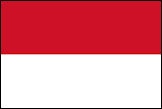
Indonesien und das Free Aceh Movement (Gerakan Aceh Merdeka - GAM) schließen in Helsinki ein Friedensabkommen. 29 Jahre lang hatte der Bürgerkrieg gedauert.
Abb.: Lage von Aceh
[Bildquelle: CIA. -- Public domain]
"Am 15. August 2005 unterzeichneten Vertreter der Regierung und die Achinesische Befreiungsbewegung (GAM) in Helsinki ein Friedensabkommen. Das Abkommen sieht vor, dass die GAM entwaffnet wird und eine politische Partei gründet. Die indonesische Armee soll sich schrittweise aus der Provinz zurückziehen. Außerdem einigten sich die Konfliktparteien auf eine Teilautonomie der Provinz sowie auf eine Amnestie für verurteilte Mitglieder der GAM. Die Einhaltung des Abkommens wird von der Europäischen Union, fünf Mitgliedsstaaten der Gemeinschaft Südostasiatischer Staaten (ASEAN) (Brunei, Malaysia, Philippinen, Singapur, Thailand) und Norwegen und der Schweiz überwacht. Hierzu wurden 11 Büros der Aceh Monitoring Mission (AMM) unter der Leitung des Niederländers Pieter Feith in den 11 Distrikten eingerichtet. Die AMM hat einen Etat von ca. 15 Millionen Euro. Bis zum 27. Januar 2006 hatte die GAM rund 850 Waffen an die AMM übergeben, im Gegenzug wurden 1.800 Kämpfer und Sympathisanten der GAM aus den Gefängnissen entlassen und erhielten eine Amnestie." [Quelle: http://de.wikipedia.org/wiki/Aceh#Aktuelle_Konflikte. -- Zugriff am 2012-01-03]
2005-08-16
Der Touristenort Pai (ปาย), Provinz Mae Hongson (แม่ฮ่องสอน), wird mit Schlammmassen überschwemmt. Über 50 Resorts am Fluss werden schwer beschädigt. Sachschäden in der Stadt ca. 200 Mio. Baht.
Abb.: Lage von Pai (ปาย)
[Bildquelle: OpenStreetMap. -- Creative Commons Lizenz (Namensnennung, share alike)]
Abb.: Pai (ปาย)
[Bildquelle: ©Google earth. -- Zugriff am 2012-01-07]
2005-08-16
Innenminister Kongsak Wantana (คงศักดิ์ วันทนา, 1945 - ) kündigt an, dass er in Teehäusern der muslimischen Provinzen Südthailands 500 Fernseher aufstellen will, die britische Fußballspiele übertragen sollen. Das soll die Gewalttätigkeiten in Südthailand reduzieren, da Jugendliche, die sonst zu Gewalt neigen, von den Spielen gefesselt würden.
2005-09-01 -

Der Franzose Pascal Lamy (1947 - ) ist Generaldirektor der World Trade Organization (WTO).
2005-09-02
Bangkok Post:
"Ten suspects were yesterday arrested in connection with explosions that took place in Narathiwat's [นราธิวาส] Sungai Kolok [สุไหงโกลก] district on Wednesday night. One suspect, Maroning Armor, was seen leaving a bag containing a bomb in front of a karaoke shop. Police searched his house and found electric wires, mobile phones and wire-cutters.
Abb.: Lage von Su-ngai Kolok [สุไหงโกลก]
[Bildquelle: OpenStreetMap. -- Creative Commons Lizenz (Namensnennung, share alike)]In Yi-ngo [ยี่งอ] district, seven youths suspected of involvement in the attacks were caught and two others arrested in Bacho district [บาเจาะ]. Two more bombs exploded in Narathiwat yesterday morning, wounding seven people The first bomb, planted on a roadside in Sungai Padi [สุไหงปาดี] district, exploded around 8:05 a.m. wounding two teachers and two soldiers. Shortly afterwards, another bomb went off in front of an electrical shop in Narathiwat municipality [นราธิวาส].
Abb.: Lage von Yi-ngo [ยี่งอ] und Su-ngai Padi [สุไหงปาดี]
[Bildquelle: OpenStreetMap. -- Creative Commons Lizenz (Namensnennung, share alike)]
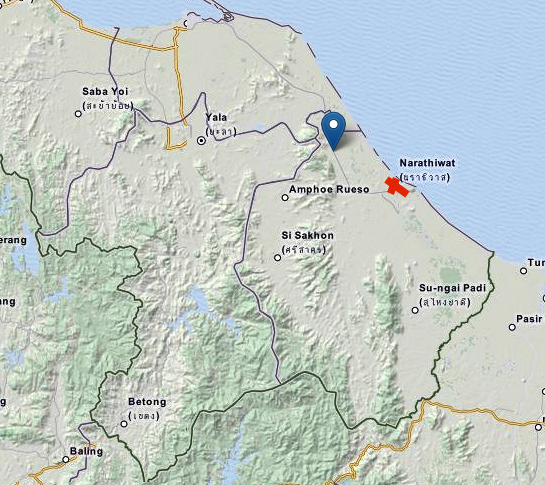
Abb.: Lage von Bacho [บาเจาะ] und Narathiwat
[Bildquelle: OpenStreetMap. -- Creative Commons Lizenz (Namensnennung, share alike)]In Yala [ยะลา], a religious teacher was shot dead on his way to school in Muang district. Abdulloh Malee, 38, of Pattana Witthaya Lammia School, was attacked on his way to work around 8.45 a.m. by a pillion rider on another motorcycle.
In Pattani [ปัตตานี / ڤتنا], Satopa Arawee, 39, researcher, was wounded in a gun attack in Muang district about 10.30 a.m."
Abb.: Lage von Yala [ยะลา] und Pattani [ปัตตานี / ڤتنا]
[Bildquelle: OpenStreetMap. -- Creative Commons Lizenz (Namensnennung, share alike)][Zitiert in: Anderson, Wanni W. (Wanni Wibulswasdi) <1937 - >: Mapping Thai Muslims : community dynamics and change on the Andaman Coast. -- Chiang Mai : Silkworm, 2010. -- 185 S. : Ill. ; 21 cm. -- ISBN 9789749511923. -- S. 116f. -- Fair use]
2005-09-08
Premiere des Films Yam Yasothon (แหยม ยโสธร) von Petchtai Wongkamlao (เพ็ชรทาย วงษ์คำเหลา, 1965 - ).
Abb.: Plakat
[Bildquelle: Wikipedia. -- Fair use]
Abb.: Lage der Provinz Yasothon (ยโสธร)
[Bildquelle: OpenStreetMap. -- Creative Commons Lizenz (Namensnennung, share alike)]
"Yam Yasothon (Thai: แหยม ยโสธร, English title: Hello Yasothon) is a 2005 Thai musical romantic comedy film, written, directed by and starring Petchtai Wongkamlao (เพ็ชรทาย วงษ์คำเหลา, 1965 - ). Plot
The story is set in 1967 Yasothon Province (ยโสธร), Thailand, where Yam is a hard-working, humble and kind farmer – kind that is except when it comes to the attentions of Joei, the homely maid of Soy, who is the girlfriend of Yam's cousin, Tong. Yam tends to stray and injured animals of all kinds, but he never has nice things to say to Joei. Despite this, she persists in flirting with Yam and making unwanted physical advances.
Meanwhile, Soy and Tong cuddle, kiss and hug each other at every opportunity.
Soy's aunt, the haughty village moneylender, Dok Toh, disapproves of Soy seeing Tong, whom Dok Toh believes is too low class for her niece. She orders Soy and Joei to stay away from Yam and Tong. The social-climbing Dok Toh additionally arranges for Soy to meet the handsome yet dull son of the local sheriff, who has a pair of slow-witted henchmen who will help enforce Dok Toh's orders that Joei and Soy never again see Yam and Tong.
However, on the night of a village temple fair, Tong and Soy and Yam and Joei sneak away and each couple finds a place to spend the night together. Tong and Soy stay up all night talking about their true feelings for one another, while Joei takes sexual advantage of Yam.
Dok Toh finds out about Joei and Soy's misadventures and arranges to send them away to Bangkok. Soy will attend a trade school, learning English language and secretarial skills while Joei will learn to be a seamstress and hairdresser. With the money earned while she is in Bangkok, Joei transforms herself by creating a new wardrobe and undergoing beauty treatments, including having her skin lightened, a prominent mole removed and her teeth straightened and whitened.
In Joei's absence, Yam begins to long for her, discovering that he had a place for her in his heart after all. Both Soy and Joei write letters to their men, but they hear nothing in return. It turns out that Dok Toh has bribed the postman to deliver letters addressed to Yam and Tong to her, and she in turn dumps the letters into the river.
Joei and Soy determine that their letters aren't getting through, so they write to the abbot at the local Buddhist temple and ask him to deliver their letters to Yam and Tong.
Yam and Tong, meanwhile, strike out on their own and head for Bangkok to try to find the girls. Neither had ever been to the city before, and did not realize how big the capital was. Discouraged by their lack of success, they return home, but through the efforts of the monk, they finally hear from Soy and Joei.
The girls return to Yasothon for Songkran (สงกรานต์), and Soy is reunited with Tong. Yam is heartbroken when he does not see Joei on the bus. In fact she was on the bus, but because she had drastically changed her appearance, Yam did not recognize her, and showed no interest in Joei when she approached him.
The engagement of Soy and the sheriff's son is still on, though. Tong falls into despair, starts drinking and becomes a hopeless alcoholic. On the day of the engagement ceremony, Tong's father shows up with shotgun to disrupt the proceedings. He points out that Soy does not love the sheriff's son and he demands that Tong be allowed to marry Soy.
As for Yam, he comes around and sees that Joei is the same woman, even if she's changed on the outside.
CastReception
- Petchtai Wongkamlao (เพ็ชรทาย วงษ์คำเหลา, 1965 - ) as Yam (แหยม)
Janet Khiew (เจเน็ต เขียว) as Joei (เจ้ย)
- Waew Jokmok (aka เทียมใจ วงษ์คำเหลา) as Dok Toh (ดอกท้อ)
- Chaipan Ninkong (ชัยพันธ์ นินกง) as Tong (ทอง)
Yaoluck Tumbhun (เยาวลักษณ์ ตุ้มบุญ) as Soy (สร้อย)
Yam Yasothon was one of the biggest hits of the year at the Thai box office. Janet Khiew was nominated for best actress at the Thailand National Film Association Awards (รางวัลภาพยนตร์แห่งชาติ สุพรรณหงส์). The film predominantly used the Isan dialect (ภาษาอีสาน, ພາສາລາວ) and had subtitles in Central Thai language (ภาษาไทย)."
[Quelle: http://en.wikipedia.org/wiki/Yam_Yasothon. -- Zugriff am 2012-01-06]Der Film ist das Debut der Comedy-Schauspielerin Sudarat "Tukky" Butrprom (สุดารัตน์ "ตุ๊กกี้" บุตรพรม, 1979 - ). Sie wird in zahlreichen TV-Shows auftreten.
Abb.: Plakat
[Fair use]
2005-09-15
Neue 2-Baht-Münzen (บาท):
Abb.: 2-Baht-Münze (บาท) ab 2005
[Bildquelle: th.Wikipedia]
2005-09-15
Premiere des Films Ghost of Mae Nak (นาค รักแท้/วิญญาณ/ความตาย) von Mark Duffield
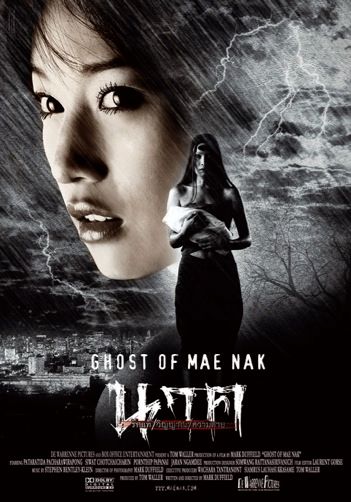
Abb.: Plakat
[Bildquelle: Wikipedia. -- Fair use]
|
Der Geist von Mae Nak (Thai: นาค: รักแท้ · วิญญาณ · ความตาย, Aussprache: [nâːk : rák-tʰǽ, win-yaːn, kʰwaːm taːj] – wörtlich: Naga: wahre Liebe, Geist, Sterben) ist eine weitere Verfilmung der populären thailändischen Legende Mae Nak, die 2005 in thai-britischer Ko-Produktion entstand. Regie führte Mark Duffield. HandlungDie Geschichte beginnt damit, dass ein thailändisches Paar, Nak (นาค) und Mak (มาก), ein Haus kaufen wollen. Während der Besichtigung des Hauses sieht Mak einen Geist, der ihn fortan in Albträumen wiederbegegnet. Mak entscheidet sich dennoch zum Erwerb des Eigenheims. Nach dem Kauf erwirbt Nak ein Amulett in einem Laden. Kurz darauf wird der Hausverkäufer Fah (แองเจิล) scheinbar von einem Geist auf eine ungewöhnliche Weise geköpft. Am nächsten Tag macht sich Nak, die Verlobte von Mak, auf den Weg zu einem Seher um ihn zu ihrer bevorstehenden Hochzeit einzuladen. Kurz darauf findet die Hochzeit statt. In der Hochzeitsnacht ziehen beide in das gekaufte Haus ein. Mak sieht in seinen Träumen „den Geist“ wieder. Er merkt bald, dass etwas nicht stimmt. Als Nak und Mak am nächsten Tag von der Arbeit zurückkommen, stellen sie fest, dass bei ihnen eingebrochen wurde und sämtliche Sachen gestohlen wurden. Mak zeigt den Diebstahl bei der Polizei an. Kurz darauf findet er seine Sachen, die zum Verkauf stehen, in einer Straße wieder. Bei dem Versuch, die Diebe zur Rede zu stellen, wird er von einem Auto erfasst. Seitdem liegt Mak im Koma. Bei dem Krankenbesuch erfährt Nak alleine von Mak, dass sie „Mae Nak“ (แม่นาก) finden solle. Da Nak die Geschichte von Mae Nak nicht kennt, fragt sie ihre Oma, die sie ihr wie folgt erzählt: „Mae Nak“ sei ein Geist. Sie sei bei der erfolglosen Entbindung ihres Kindes verstorben. Ihre Liebe sei so stark, dass sie nach ihrem Tod immer noch als Geist sichtbar sei. Phi Mak, ihr Ehemann, der nichts von ihrem Tod wusste, kam nach Hause zurück. Er merkte nicht, dass seine Frau bereits verstorben war. Zwar versuchten die Nachbarn Phi Mak zu warnen, jedoch glaubte er nicht daran. Als er jedoch später ihren Leichnam sah, fand er sich damit ab. Um dem Spuk ein Ende zu bereiten, schnitt ein Mönch ein Stück von ihrem Schädel und seitdem schien Mae Nak verschwunden zu sein. Zunächst kann Nak keine Zusammenhänge erkennen, als aber ihr Rechtsanwalt mitteilt, dass ihr Hausverkäufer Fah verstorben sei, wird sie allmählich misstrauisch. Sie erfährt, dass Fah ein Betrüger war (er hatte eine spezieller Klausel, mit der er den Verkaufspreis bedeutend erhöhen konnte, eingebaut), und dass er nie die Absicht hatte, das Haus zu verkaufen. Nun, da Fah gestorben ist, ist Nak die rechtmäßige Besitzerin des alten Hauses. Kurz darauf entdeckt Nak auf einem Flohmarkt ihre gestohlene Kleidung wieder. Bei dem Versuch, das Hemd zu entwenden, sieht sie das Amulett, welches Mak ihr geschenkt hat. Dieses schnappt sie und rennt vor den Dieben weg. Nak entwischt und der Dieb wird später von dem Geist von Mae Nak getötet. Mit Hilfe des Amuletts sieht sie ihre alte Schule, in der sie sich mit Mak zum ersten Mal geküsst hat. Sie geht damit zum Seher und erfährt, dass dieses Amulett ursprünglich das fehlende Knochenstück von Mae Nak ist. Nak geht instinktiv zur alten Schule, unter der, wie sich später herausstellt, das Grab von Mae Nak ist. Nak organisiert Hilfe und gräbt an der besagten Stelle. Als sie die Knochen entdecken, wird sie von der Polizei überrascht und sie werden verhaftet. Später, nachdem Nak entlassen wurde und Maks Zustand (inzwischen liegt er bei den Mönchen) sich nicht verbessert hat, bittet sie Chai (ชัย), sie zur Leichenhalle zu schmuggeln, damit sie das fehlende Knochenstück von Mae Nak einsetzen kann und so ihr Geist wahrscheinlich befreit wird. Dies gelingt ihr und Mak wacht mitten in dem Exorzismusritual auf. In der Schlussszene sieht man Nak und Mak im Bett, wo sie beide gleichzeitig von ihrem Albtraum verschwitzt aufwachen - offensichtlich war die ganze Geschichte ein schlechter Traum. Besetzung
[...] Kritiken„Neuerliche Verfilmung der thailändischen „Nang Nak“-Legende, die Elemente der Geisterhaus-Geschichte mit asiatischen Gespenstergeschichten mischt und durch die ausgeklügelte Kameraarbeit eine dichte Atmosphäre aufbaut.“ – Lexikon des internationalen Films Frühere Mae Nak VersionenDieser Film gibt es wie Romeo und Julia in verschiedenen Versionen. Laut Duffield soll seine Mae Nak die 21. Version sein.[2]" [Quelle: http://de.wikipedia.org/wiki/Der_Geist_von_Mae_Nak. -- Zugriff am 2013-03-22] |
2005-09-19

Ministerpräsident Thaksin trifft im Pentagon (Washington DC, USA) US-Verteidigungsminister Donald Rumsfeld und bespricht mir ihm "Angelegenheiten gegenseitigen Interesses".
Abb.: Lage von Washington DC (USA)
[Bildquelle: OpenStreetMap. -- Creative Commons Lizenz (Namensnennung, share alike)]
Abb.: Donald Rumsfeld
[Bildquelle: DonkeyHotey. -- http://www.flickr.com/photos/donkeyhotey/5436736622/. -- Zugriff am 2012-01-17. -- Creative Commons Lizenz (Namensnennung, share alike)]
Abb.: Donald Rumsfeld / von Murray Webb (1947 - ), 2006
[Bildquelle: Donald Rumsfeld. 5 May, 2006.. Webb, Murray, 1947- :[Digital caricatures published from 29 July 2005 onwards (2006, 2007, 2008). Includes a selection of digital caricatures published from 2002 and up to July 2005.]. Ref: DCDL-0001485. Alexander Turnbull Library, Wellington, New Zealand. http://natlib.govt.nz/records/22742188. -- Zugriff am 2013-03-09. -- "You can copy this item for personal use, share it, and post it on a blog or website. It cannot be used commercially without permission"]
2005-09-20 2005-09-27
2005 Asian Men's Volleyball Championship in Suphanburi (สุพรรณบุรี). In der Gesamtwertung gewinnt Thailand den 5. Platz.
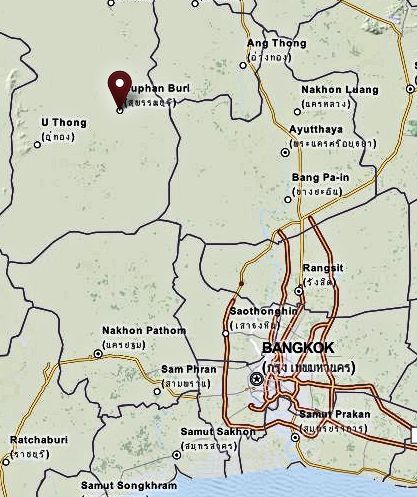
Abb.: Lage
von Suphanburi (สุพรรณบุรี)
[Bildquelle: OpenStreetMap. --
Creative
Commons Lizenz (Namensnennung, share alike)]
2005-09-20
Atchara McKay (อัจฉรา แมคคาย), Miss Thai World 2005, gibt ihren Titel zurück, nachdem sie feststellte, dass sie ihr Vertrag verpflichten würde, ein ganzes Jahr in Thailand zu bleiben. Die Thai-Australierin spricht nur gebrochenes Thai und hat darum den Vertrag zuerst nicht verstanden. An ihrer Stelle erhält Cindy Sirinda Jensen (ซินดี้ สิรินดา เจนเซน) den Titel.
2005-09-22
Zwei Marines werden in den Südprovinzen gefoltert und getötet. Daraufhin bläst die Regierung zur Menschenjagd.
2005-09-23
Bangkok Post:
Abb.: Lage von Ra-ngae [ระแงะ]
[Bildquelle: OpenStreetMap. -- Creative Commons Lizenz (Namensnennung, share alike)]
"Two marines were grabbed by residents of a village in Rangae district [ระแงะ] at about 8:30 p.m. on Tuesday. They went into the village to gather information on a shooting in a tea shop with AK-47 [Kalaschnikow / Автомат Калашникова] rifles by unknown assailants, which wounded six villagers. Two later died. Following the shooting incident, rumors spread in the village that it was the work of soldiers. Sub-Lt. Winai and Po Khamthon were about to leave in a blue Toyota Soluna car but failed to get the engine started. They were mobbed and taken captive by a group of villagers. Although they were armed, the mas did not fight back or resist. Khunying Porntip Rajanasunan [พรทิพย์ โรจนสุนันท์, 1955 - ] (deputy director of the Central Institute of Forensic Sciences), who went into the village yesterday for an inspection of the scene and to collect evidence for further forensic examination, said the two marines have been beaten up and tortured. "They had their hands tied to their back, their feet tied up. They were blindfolded and gagged. They were repeatedly beaten about the head and stabbed many times in the body. Hot liquid was also poured on them," she said.... Inside the building where the two victims were detained, soldiers discovered a hammer which was used to hit their nails and toes. The two marines were [found] wearing shorts and their T-shirts had been taken off....
After the killing, all men stayed inside the village. Women and children formed a human shield to prevent soldiers from charging into the village."
[Zitiert in: Anderson, Wanni W. (Wanni Wibulswasdi) <1937 - >: Mapping Thai Muslims : community dynamics and change on the Andaman Coast. -- Chiang Mai : Silkworm, 2010. -- 185 S. : Ill. ; 21 cm. -- ISBN 9789749511923. -- S. 117. -- Fair use]
2005-09-30

Tim O’Reilly (1954 - ) definiert in einem Aufsatz Web 2.0.
Abb.: Merkmale von Web 2.0
[Bildquelle: Markus Angermeier / Wikipedia. -- Creative Commons Lizenz (Namensnennung, share alike)]
"A Web 2.0 site may allow users to interact and collaborate with each other in a social media dialogue as creators of user-generated content in a virtual community, in contrast to websites where people are limited to the passive viewing of content. Examples of Web 2.0 include
- social networking sites,
- blogs,
- wikis,
- video sharing sites,
- hosted services,
- web applications,
- mashups and
- folksonomies."
[Quelle: http://en.wikipedia.org/wiki/Web_2.0. -- Zugriff am 2013-04-27]
2005-10
Debut des Pop-Duos Golf-Mike (กอล์ฟ-ไมค์)
Die Gruppe auf Spotify:
URI:
spotify:artist:3NhJcEicvcVRAyAE7lbUt0
URL:
https://open.spotify.com/artist/3NhJcEicvcVRAyAE7lbUt0

Abb.:
Golf-Mike (กอล์ฟ-ไมค์), 2008
[Bildquelel: Sry85 / Wikimedia. --
Creative Commons
Lizenz (Namensnennung)]
|
"Golf & Mike, more often credited in Thailand as Golf-Mike (Thai: กอล์ฟ-ไมค์), is a Thai pop duo artist consisting of brothers Pichaya "Golf" Nitipaisalkul (พิชญะ นิธิไพศาลกุล - กอล์ฟ, 1987 - ) and Pirat "Mike" Nitipaisalkul (พิรัชต์ นิธิไพศาลกุล - ไมค์, 1989 - ), formed under Thailand's biggest entertainment company, GMM Grammy. Members
Golf was born on February 20, 1987, into a family of Thai-Chinese descent and the younger brother of Sand and Bank, a retired musical sibling duo that was under record label RS Entertainment. Mike was born on December 19, 1989, the youngest son in the family. Influenced by their older brothers, Golf and Mike aspired to be singers. Golf & Mike have their very own clothing range, which appears in popular shopping areas such as Siam Square (สยามสแควร์) in Thailand. Golf is currently studying at SAE University. Mike is currently studying at Chulalongkorn University (จุฬาลงกรณ์มหาวิทยาลัย)." [Quelle: http://en.wikipedia.org/wiki/Golf_%26_Mike. -- Zugriff am 2013-04-09] |
2005-10-01 - 2007-09-30
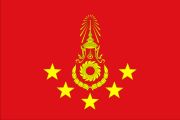
General Sonthi Boonyaratglin (พลเอก สนธิ บุญยรัตกลิน, 1946 - ) ist Commander-in-Chief of the Royal Thai Army (ผู้บัญชาการทหารบก).
Abb.: Sonthi Boonyaratglin (พลเอก สนธิ บุญยรัตกลิน)
[Bildquelle: http://www.rta.mi.th/26000u/Immage/OldCommand/Sonthi.jpg. -- Zugriff am 2015-06-07. -- Fair use]
2005-10-01

Das Hauptquartier der 1934 gegründeten International Badminton Federation (IBF) wird aus Großbritannien nach Kuala Lumpur (Malaysia) verlegt. Präsident war von 2001 - 2005 der Thailändische Politiker Korn Dabbaransi (กร ทัพพะรังสี, 1945 - )
2005-10-10
Premiere des Films The King Maker (กบฎท้าวศรีสุดาจันทร์) von Lek Kitaparaporn (เล็ก กิติพราภรณ์)
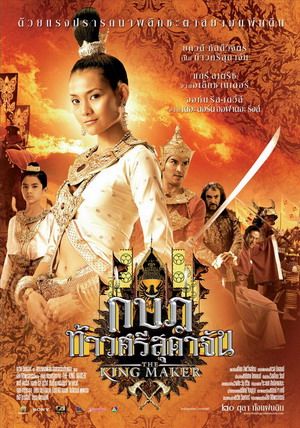
Abb.: Plakat
[Bildquelle: Wikipedia. -- Fair use]
|
The King Maker (Thai: กบฎท้าวศรีสุดาจันทร์, or The Rebellion of Queen Sudachan, is a 2005 Thai historical drama film set during the Ayutthaya kingdom (อาณาจักรอยุธยา). With a storyline that shares many similarities to 2001's The Legend of Suriyothai (สุริโยไท), The King Maker's plot focuses on a Portuguese mercenary (Gary Stretch) in the service of the Siamese court. Produced by David Winters (1939 - ), it was the first English-language Thai film production since the 1941 film, King of the White Elephant (พระเจ้าช้างเผือก), produced by Pridi Phanomyong (ปรีดี พนมยงค์, 1900 - 1983). This was also the first Thai film sold to a "Major film studio". PlotThe story opens with Portuguese soldier Fernando de Gama drowning in the ocean after a shipwreck. He comes to, finds some wreckage to float on and washes up on the coast of Siam. After almost being eaten by a crocodile, he is captured by Arab slave traders and taken to Ayutthaya. Released from his bonds to be put on the auction block, he promptly knocks down his captors and leads them on a chase throughout the ancient city. Eventually, he is brought under control, but not before he is captured the attention of a Eurasian beauty, Maria, who buys him his freedom back. After recovering from his recapture, Maria brings Fernando to meet her father, Phillippe. Fernando immediately recognizes Phillippe as the man who killed Fernando's father many years ago, whom Fernando has been seeking on a lifetime quest for revenge. But there are bigger battles to be fought. Fernando and his Portuguese compatriots are pressed into the service of King Chairacha (ไชยราชา, reg. 1534 - 1546), who has to go into battle. It is a multi-national taskforce, not only including Portuguese mercenaries, but also samurai warriors (侍) (likely Christians expelled from Japan). In battle, Fernando bonds with a Thai warrior named Tong (ทอง). They distinguish themselves by saving the King from an assassination attempt and are appointed his personal bodyguards. Queen Sudachan (ท้าวศรีสุดาจันทร์), a former royal consort who schemed her way into becoming queen, is behind the assassination plot. Because it failed, she calls on Don Phillippe for help. Phillippe in turn enlists a scar-faced ninja (忍者) to kill the king. This plan is also thwarted by Fernando, Tong and other Siamese troops. After the assassins are killed in the king's bedroom, King Chairacha assigns Tong and Fernando the task of seeking out whoever is behind this scheme. Recognizing one of the dead assassins as the scar-faced ninja he had seen Phillippe talking with earlier that night, Fernando confronts Phillippe. They fight, and Phillippe is killed by Tong. Meanwhile, the queen resorts to black magic to poison the king. She also must kill her own son, Prince Yodfa (พระยอดฟ้า, 1535 - 1548) (who is next in line for the throne), to clear the way for her boyfriend Worawongsathirat (วรวงศาธิราช), reg. 1548). This she achieves by hiring a spear-wielding African warrior. Succeeding in her plot, Fernando and Tong are then framed for the deaths and made to fight each other in a death duel for Queen Sudachan, her new king, and the crowd's amusement. Tong's family and Maria's life are threatened, and Tong throws an axe at Worawongsathirat, slaying him. Moments before the queen kills Tong and Fernando in revenge, King Chairacha's brother Maha Chakkraphat (สมเด็จพระมหาจักรพรรดิ, 1509–1569) arrives. Having deduced on his own that the queen is behind the king and prince's deaths, he arrests the queen and releases our heroes and their loved ones. In an ending text, it is stated that news of these events were heard by the king of Burma, and that the story's impression of disarray is what caused the Burmese invasion and the eventual decline and destruction of Ayutthaya. Cast
[Quelle: http://en.wikipedia.org/wiki/The_King_Maker, Zugriff am 2013-03-22] |
2005-10-12


NZZ: Der ethnische Konflikt in Südthailand erneut im Rampenlicht : Nach Malaysia geflohene Muslime sorgen für Spannungen mit dem Nachbarland.
Abb.: Lage von Malaysia
[Bildquelle: CIA. -- Public domain]
"Ende vergangener Woche ist Malaysias Botschafter in Bangkok, Shaarami bin Ibrahim, ins thailändische Außenministerium zitiert worden. Dort wurde ihm ein «formaler Protest» gegen öffentliche Bemerkungen des malaysischen Außenministers Syed Hamid Albar übergeben. Die Äußerungen wurden von der Bangkoker Regierung als Einmischung in innere Angelegenheiten des Königreichs eingestuft. Syed hatte in Kuala Lumpur vor Medienvertretern gesagt, seine Regierung brauche ausdrückliche Zusicherungen, dass in Thailands Südprovinzen die Menschenrechte respektiert würden, bevor 131 von dort nach Malaysia geflüchtete Muslime ins Nachbarland zurückgeschickt würden. Bangkoks Protestnote hielt dieser Bemerkung entgegen, die Menschenrechte würden in Thailand höher gehalten als irgendwo sonst in Südostasien. Überdies hätten Syeds Worte das Vertrauen der thailändischen Muslime in die Behörden des Heimatstaates weiter untergraben, anstatt dass die seit 22 Monaten andauernde Gewaltwelle besänftigt werde." [Quelle: NZZ Internationale Ausgabe. -- 2005-10-12. -- S. 5. -- Fair use]
Abb.: Syed Hamid bin Syed Jaafar Albar (1944 - )
[Bildquelle: Wikipedia. -- Public domain]
2005-10-18
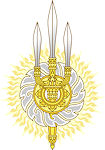
Die 600 Niederlassungen der Siam Commercial Bank (ธนาคารไทยพาณิชย์ ; Hauptaktionär: Crown Property Bureau - สำนักงานทรัพย์สินส่วนพระมหากษัตริย์) verkauft an einem Tag eine Million Plastikarmbänder mit der Aufschrift "Long live the King" (ทรงพระเจริญ). Ein Armband kostet 100 Baht. Die Armbänder gelten als Vorbereitung zum 60jährigen Thronjubiläum 2006-06-09. Der Erlös kommt der King power Foundation (มูลนิธิ คิง เพาเวอร์) zugute. Zweck dieser 2004 gegründeten Foundation ist "to support the education and health of children"
Abb.: Armband
[Fair use]
2005-10-20
Premiere des Films Ahingsa-Jikko mee gam (อหิงสา จิ๊กโก๋ มีกรรม) von Kittikorn Kiasirikun (กิตติกร เลียวศิริกุล, aka Leo Kittikorn).
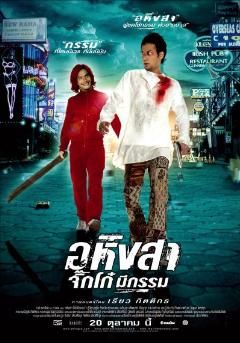
Abb.: Plakat
[Bildquelle: Wikipedia. -- Fair use]
|
"Ahingsa-Jikko mee gam (Thai: อหิงสา จิ๊กโก๋ มีกรรม, also Ahimsa ... Stop to Run) is a 2005 Thai karmic-crime-comedy-drama written and directed by Kittikorn Kiasirikun (กิตติกร เลียวศิริกุล) (Leo Kittikorn). PlotAhingsa (อหิงสา) is a young man who's haunted by his karma, which takes the form of a mysterious red-haired man who dishes out abuse when Ahingsa runs afoul of morality. When Ahingsa was a young boy, a shaman had the mysterious man removed, but the man returns when Ahingsa is a young man and starts taking drugs and getting involved in rave culture. Ahingsa's behavior soon causes trouble for his friends, Ukhoht (อุโฆษ) and Einstein (ไอน์สไตน์), and a female physician, Dr. Pattaya (พัทยา). Cast
[Quelle: http://en.wikipedia.org/wiki/Ahingsa-Jikko_mee_gam. -- Zugriff am 2013-03-22] |
2005-10-25

Königin Sirikit (สมเด็จพระนางเจ้าสิริกิติ์ พระบรมราชินีนาถ) besucht Narathiwat (นราธิวาส) und fordert die Bevölkerung zur Einheit des Thai-Königreichs auf. Die Besonderheit dieses Königreichs sei die Harmonie seiner Bevölkerung, die miteinander leben kann unbeschadet von Rasse und Religion.
Abb.: Lage von Narathiwat (นราธิวาส)
[Bildquelle: OpenStreetMap. -- Creative Commons Lizenz (Namensnennung, share alike)]
Abb.: Königin Sirikit (สมเด็จพระนางเจ้าสิริกิติ์ พระบรมราชินีนาถ), 2011
[Bildquelle: The Queen Sirikit Department of Sericulture, Government of Thailand / Wikipedia. -- Public domain]
2005-10-25

131 südthailändische malaiischsprachige Muslime fliehen nach Malaysia.
2005-10-27
Premiere des Films The Tiger Blade (เสือคาบดาบ) von Theeratorn Siriphunvaraporn (ธีระธร สิริพันธ์วราภรณ์)
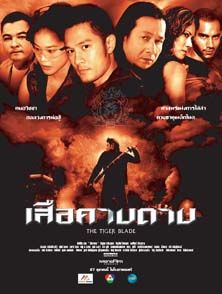
Abb.: Plakat
[Bildquelle: Wikipedia. -- Fair use]
|
"The Tiger Blade (Thai: เสือคาบดาบ or Seua khaap daap) is a 2005 Thai action film. PlotA gang of criminals with supernatural powers, led by Mahesak (มเหศักดิ์), break a rebel Karen (กะเหรี่ยง) warlord Kaoyot (เก้ายอด)out of prison, and plan to steal the national treasury of Thailand in order to fund Kaoyot's continuing fight. A secret police unit, led by Yosthana (ยศธนา) engages the criminals in various battles. Among the criminals they must face are the Five Bullets Bandit and the female warrior, G.I. Jenjila (จี ไอ เจนจิรา ). Though the police unit puts up a good fight, among them female officer Deungdao (ดวงดาว), in order to ultimately defeat the criminals, they need to use magic. So Yosthana obtains an old, magical sword, which is activated by the menstrual blood of a virgin. Cast
The Tiger Blade was released on October 27, 2005 in Thailand cinemas, where critical and box-office response was practically non-existent. The film received more attention overseas. The Canada-based genre film website, Twitch, praised the film as "pure guilty pleasure" while acknowledging weaknesses that included an unnecessarily convoluted and complicated plot, subpar computer-generated imagery, and poorly framed and edited action sequences. "This is all true. But, damn it, what [The Tiger Blade] does well it does really well, and what it does well is have fun," Twitch's Todd Brown wrote.[1] The film was released on an all-region DVD in Thailand, with English subtitles, but that release is censored to blur out guns, smoking and alcohol consumption. Subsequent DVD releases in Canada, France (by Luc Besson's EuropaCorp), Japan and Hong Kong are uncensored. The movie has also been release on Blu-ray disc[1]" [Quelle: http://en.wikipedia.org/wiki/The_Tiger_Blade. -- Zugriff am 2013-03-22] |
2005-10-31

Es erscheint:
Veera Prateepchaikul: NRC riole in South not clearly understood. -- In: Bangkok Post. -- 2005-10-31
"Rarely have Buddhist monks in the deep South spoken up to voice their feelings or grievances about the continuing violence down there and how the situation has been handled by the government or the National Reconciliation Commission (NRC). Last week, monks in Pattani [ปัตตานี] decided to break their long silence in a way which was both shocking and worrisome. They accused the NRC of being biased and too sympathetic with Islamic militants and demanded that the commission be dissolved.
The monks also called for a boycott of made-in-Malaysia products, apparently in retaliation for a similar call by a radical Malaysian activist group.
Why this negative view of the NRC among Pattani clerics while the commission is being hailed by peace advocates, human rights-conscious groups and other religious practitioners elsewhere?
The following remarks made by Phra Maha Pusit Thitasiri, a well-known preacher at Wat Sri Mahabhodi in Kok Pho district [โคกโพธิ์] of Pattani might offer some clues.''Every time a problem occurred, Thai Buddhists were rarely questioned and only the Thai Muslims were. When a problem involved Thai Buddhists, it was reported by the media and then it just faded away unlike the Krue Se [มัสยิดกรือเซะ] and Tak Bai [ตากใบ] incidents which were dramatised and treated with too much attention,'' he said.
''Villagers complained to me that when Thai Buddhists were harmed their cases were not given proper attention. Some complained that the commission was more concerned with reconciling with the other side. I am not biased. Every time there has been a meeting, the monks have been asked to help restore peace. I would like to say that even if there is no peace now, we monks have been living in peace.''
Abb.: Lage von Amphoe Khok Pho [โคกโพธิ์]
[Bildquelle: OpenStreetMap. -- Creative Commons Lizenz (Namensnennung, share alike)]
Given the above remarks, it can be assumed that there is still a lot of misunderstanding among the public about the NRC's role in the deep South. Many people, including the monks in Pattani, apparently, believe that the NRC has a responsibility to deal with the almost daily violence. This is incorrect.
The commission's mandate is to investigate the Krue Se and Tak Bai incidents and to come up with a set of recommendations for the government on how to restore peace and order in the deep South so that both Buddhists and the Thai-Malay Muslims can live together in harmony.
Yet the commission should not ignore the voices of the Pattani monks even if they might come from a misunderstanding of the commission's role.
The monks and Buddhist lay people in Pattani, Yala and Narathiwat who live alongside the majority Muslims should not be left out from the peace process being undertaken by the commission. Their voices must be heard and recognised.
Under the climate of fear which is looming in the deep South, it is understandable that many people, both Buddhists and Muslims, are desperate, frustrated and even eager to hold someone as a scapegoat upon which they can vent their anger.
It is, however, fortunate that not all the monks in the deep South have lost faith in the NRC. Monks in Yala [ยะลา] and Narathiwat [นราธิวาส] want the NRC to serve up its full term which is due to come to an end next March even though they share the opinion that the commission should be more open to the views of Buddhists in the region.
Hopefully, the spat between the Pattani monks and the NRC will not intensify and can be resolved quickly. It is noteworthy that Prime Minister Thaksin Shinawatra has chosen to downplay the event by assuring his full support to the NRC to carry on its job until the end of its term."[Quelle.: http://newsgroups.derkeiler.com/Archive/Soc/soc.culture.thai/2005-11/msg00082.htm. -- Zugriff am 2016-03-17. -- Fair use]
2005-11-02

Es erscheint:
Priest, Dana: CIA holds terror suspects in secret prisons. -- In: Washington Post. -- 2005-11-02
"By mid-2002, the CIA had worked out secret black-site deals with two countries, including Thailand and one Eastern European nation, current and former officials said. An estimated $100 million was tucked inside the classified annex of the first supplemental Afghanistan appropriation. Then the CIA captured its first big detainee, in March 28, 2002. Pakistani forces took Abu Zubaida [geb.أبو زبأبو زبيدة] [1971] , al Qaeda's operations chief, into custody and the CIA whisked him to the new black site in Thailand, which included underground interrogation cells, said several former and current intelligence officials. Six months later, Sept. 11 planner Ramzi Binalshibh [1972 - ] [ رمزي بن الشيبة] was also captured in Pakistan and flown to Thailand.
But after published reports revealed the existence of the site in June 2003, Thai officials insisted the CIA shut it down, and the two terrorists were moved elsewhere, according to former government officials involved in the matter. Work between the two countries on counterterrorism has been lukewarm ever since.
In late 2002 or early 2003, the CIA brokered deals with other countries to establish black-site prisons. One of these sites -- which sources said they believed to be the CIA's biggest facility now -- became particularly important when the agency realized it would have a growing number of prisoners and a shrinking number of prisons.
Thailand was closed, and sometime in 2004 the CIA decided it had to give up its small site at Guantanamo Bay. The CIA had planned to convert that into a state-of-the-art facility, operated independently of the military. The CIA pulled out when U.S. courts began to exercise greater control over the military detainees, and agency officials feared judges would soon extend the same type of supervision over their detainees. "
[a.a.O. -- Online: http://www.washingtonpost.com/wp-dyn/content/article/2005/11/01/AR2005110101644_4.html. -- Zugriff am 2016-03-15. -- Fair use]
2005-11-03
Für den Einsatz in den südlichsten Provinzen sollen 375 Pramilitärs des Thahan Phran (ทหารพราน, Rangers) rekrutiert werden.
2005-11-08

Bericht des US-Generalkonsulats in Chiang Mai (เชียงใหม่) an das US-Außenministerium:
"1. Summary. After three years of rosy official promises and assorted citizen protests, the Chiang Mai Night Safari's [เชียงใหม่ไนท์ซาฟารี] long-delayed unveiling during the Loy Krathong [ลอยกระทง] celebration has been quietly pushed back once again. Rather than announce another postponement, Prime Minister Thaksin Shinawatra [ทักษิณ ชินวัตร, 1949 - ] will preside over a "closed opening" for invited business guests from Bangkok on November 16. The history of the project combined with plans for further tourism-promotion projects in Chiang Mai demonstrates that development and decision making remain centralized in the capital, far from local view or influence. End summary. 2. Under the guise of giving tourists "something to do at night" Prime Minister Thaksin Shinawatra proposed a Chiang Mai Night Safari in 2002 after visiting the one in Singapore. Local business and community leaders liked the idea of high spending tourists and good employment opportunities but animal rights and environmental groups objected to the location and other plans mandated by the central government. .
3. Undeterred by citizen concerns or the lowered revenue expectations of the Night Safari, the government is following suit with a new series of tourism development projects under the umbrella name of Chiang Mai World. A group calling itself the "Love Chiang Mai Alliance" delivered a petition to the governor October 17 requesting more information and a voice in the planning but has yet to receive a response.
KEEP THOSE TOURISTS BUSY
4. Thaksin, who has pledged to help develop his hometown, is an avid proponent of turning Chiang Mai into a major tourist hub. Tour businesses welcome the idea, citing Tourism Authority of Thailand (TAT) statistics that show the average visitor spends only 2.7 days in Chiang Mai. According to this view, nocturnal attractions in the city are limited to the Night Bazaar, "Khantoke" [ขันโตก] dinner shows, pubs and restaurants, and cabaret shows. Promoters of the Night Safari and additional tourism promotion projects assert that these additions to the city's nighttime charms will encourage tourists to stay longer and spend more.
5. Lined up in opposition are environmental, animal rights, and civic groups that have objected to almost every aspect of the 1.2 billion baht (US $30 million) Night Safari -- location, importation of animals from nature reserves in Kenya and Australia, consumption of precious water resources, and the redundancy of building a second zoo in a small city. "We call it the 'Narok [นรก] (Hell) Safari'", a professor at Chiang Mai University's Faculty of Agriculture told the Consul General; "the plans to import animals don't even include any quarantine." Even the name is problematic, in light of Singapore's copyright on the title.
FAUX OPENING
6. In a reprise of Prime Minister Thaksin's symbolic landing at Bangkok's not-yet-completed Suwannaphumi Airport [ท่าอากาศยานสุวรรณภูมิ] in September, the November 16 ceremony at the Night Safari will not mean the start of operations. Instead, Prime Minister Thaksin will present the project to high level business people from Bangkok -- Chang Beer [เบียร์ช้าง] and Thai International are said to be on the list -- who will be invited to support the project financially. The public opening is now scheduled for New Year's Day.
7. The newly introduced business sponsorship idea suggests that the government needs an infusion of private cash despite the original rosy expectations of 1.8 billion baht (US $45 million) revenue annually. Current projections are for 900,000 Thai visitors and 300,000 foreign visitors per year, one sixth of the number predicted earlier but still on the optimistic side. With tickets priced lower than initially conceived (US $6 for Thais and US $10 for foreigners), the government now plans to fund the project for seven years until it becomes self-supporting. In line with these adjustments the director of the project stated November 7 that the Night Safari is "not profit oriented. We just want to provide a good attraction."
8. The high hopes of surrounding communities were similarly dampened as promised business opportunities failed to materialize. Only 5 percent of the staff hired for the Night Safari staff comes from the area, according to the Tambon Administration Organization [องค์การบริหารส่วนตำบล] (TAO) president, despite the fact that "the project's executives, when first lobbying for support, promised us that 30 per cent of the project's staff would be locals".
BIG PLANS, LITTLE INFORMATION
9. According to the "Love Chiang Mai Alliance," Bangkok now plans to expand the Night Safari to include an elephant park, the "Royal Flora Rajapreuk 2006" [สวนเฉลิมพระเกียรติ ราชพฤกษ์ ] International Horticultural Exposition, a spa, an aquarium, a theme park, a cable car, monorail, convention center, plant cultivation center, ring road, bypass road, and accommodation inside the existing Chiang Mai Zoo. The Alliance estimates that the new development will occupy 23,000 rai (9,200 acres), mostly within Doi Suthep-Pui National Park [อุทยานแห่งชาติดอยสุเทพ-ปุย], with a total investment of 12 billion Baht (US $300 million).
10. Among all these ambitious plans, the government has officially announced only the elephant park and the Ministry of Agriculture's horticultural expo. The head of the Chiang Mai Chamber of Commerce [หอการค้าจังหวัดเชียงใหม่] has called on the government to provide details of the projects, noting that "local people should be informed and be able to express our opinion and participate." As yet no additional information on the development plans has been forthcoming.
11. Comment: With the latest Chiang Mai World ideas, the Bangkok administration appears to be playing "whack-a-mole" with activist groups, throwing up new centrally conceived development proposals faster than local citizens can figure out what's going on. Chiang Mai-born Thaksin has made it clear he supports development projects in his home province whatever the costs; environmental and cultural protection groups in the north are finding it hard to deflect the steamroller of Thaksin's development policy."
[Quelle: https://wikileaks.org/plusd/cables/05CHIANGMAI233_a.html. -- Zugriff am 2015-04-05]
2005-11-10
Premiere des Films Scared (รับน้องสยองขวัญ) von Pakphum Wonjinda (ภาคภูมิ วงศ์จินดา, 1965 - )
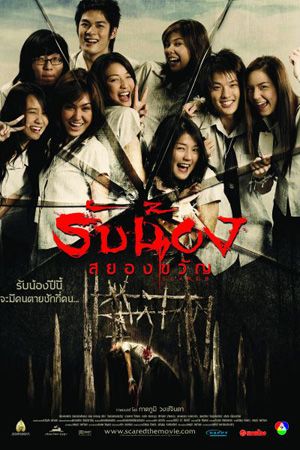
Abb.: Plakat
[Bildquelle: Wikipedia. -- Fair use]
|
"Scared – Endstation Blutbad ist ein thailändischer Splatterfilm aus dem Jahr 2005. Das dritte Werk des Regisseurs Pakphum Wonjinda (ภาคภูมิ วงศ์จินดา, 1965 - ) wurde in Thailand am 10. November 2005 veröffentlicht. In Deutschland hatte der Film seine Premiere am 25. Juli 2006 auf dem Münchener Fantasy Filmfest. HandlungAn der medienwissenschaftlichen Fakultät einer thailändischen Universität müssen sich die neuen Studenten ungewöhnlichen Initiationsriten unterziehen. Dazu gehört ein Ausflug in einen geheimnisvollen Wald. Zunächst wird der Bus mit den jungen Leuten von einem Wärter gestoppt, der ihnen die Durchfahrt verbietet. Während sich die Studenten in einer Hütte zum Essen treffen und über das weitere Vorgehen streiten, kommt ein Mann zu ihnen, der sie auf eine alternative Route hinweist und sich als Navigator anbietet. Als sie an einem hölzernen Tor anhalten, das angeblich Geister vertreiben soll, werden die Reisenden erstmals unruhig. Bei der Fahrt über eine instabile Holzbrücke stürzt der Bus in einen Fluss und ein Student stirbt. Die Überlebenden streifen auf der Suche nach Hilfe durch den Wald und geraten dabei in tödliche Gefahr. Drei Jungen setzen sich von der Gruppe ab und kommen nacheinander ums Leben. Das erste Opfer wird von einem herabstürzenden Pfahl erschlagen, der zweite Student bleibt in einem Fluss hängen und wird von einem zerbrochenen Floß durchbohrt, und der dritte wird mit einem dornigen Ast getötet. Die größere Gruppe findet am Waldrand ein verlassenes Dorf und fühlt sich in einem Kiosk mit vollen Regalen vorerst sicher. Ein unbekannter Mörder lässt ihnen allerdings keine Ruhe. Nachdem er zwei Mädchen mit der Seitenscheibe eines Autos und am Fenster einer Toilette enthauptet hat, rast er in den Kiosk und tötet einen Studenten. Ein weiteres weibliches Opfer erliegt einer Kohlenmonoxid-Vergiftung in einer Telefonzelle. Ein Student kommt mit drei Kommilitoninnen in eine Fabrikhalle. Dort gerät die Asthmatikerin Ploy (พลอย) in akute Lebensgefahr, weil sie auf der Treppe ihren Inhalator verliert. Während Pat (แพท)sich um das Mädchen kümmert, wird die andere Studentin beim Versuch, den Inhalator zu holen, vom Mörder zunächst an der Hand verletzt und nach einer Verfolgsjagd in einem Metallgitter eingequetscht. Der Junge findet jedoch das Gerät, das Ploy im letzten Moment rettet. Als drei andere Studenten versuchen, mit einem Auto zu fliehen, treffen sie auf den Mann, der sie zu Beginn des Ausflugs in den Wald führen wollte. Im Kampf können die Studenten dem Mann ein Auge ausstechen und ihn schließlich mit einer Scheibenegge töten. Doch draußen im Maisfeld wartet bereits der nächste Gegner, der Mew (หมิว) und ihren Kommilitonen mit einer Handkreissäge niedermetzelt, bevor Phii May (ปีใหม่) ihn mit seiner eigenen Waffe umbringt. Phii May fährt mit dem Auto zu den drei Studenten in der Fabrikhalle und sie fliehen gemeinsam, bis ein anderes Auto sie verfolgt und von der Straße schleudert. Anschließend gerät eine junge Frau im Krankenhaus in Panik, doch als sie an eine Tür klopft, ändert sich plötzlich die Perspektive. Nun ist ein enthusiastischer Moderator zu sehen und es wird klar, dass all die vorangegangenen Ereignisse die Handlung einer makabren Reality-TV-Show waren. Die – teilweise minderjährigen – Zuschauer können per SMS abstimmen, welche der gezeigten Personen als nächste sterben soll, und die Produzenten denken sich möglichst originelle Todesarten aus. HintergrundDie Idee, mehrere junge Menschen nacheinander auf kuriose Weise sterben zu lassen, wurde bereits erfolgreich in der Filmreihe Final Destination (2000) umgesetzt. Der Regisseur von Scared versuchte eine natürliche Ausstrahlung bei seinen Schauspielern zu erreichen, indem er sie erst am Morgen des Drehtages über die jeweilige Handlung informierte.[1] Besetzung
[Quelle: http://de.wikipedia.org/wiki/Scared_%E2%80%93_Endstation_Blutbad. -- Zugriff am 2013-03-22] |
2005-11-12
Der Minister für Soziale Entwicklung, Watana Muangsok, ruft die Frauen auf, sich bevor sie zu Bett gehen vor ihren Männern ehrerbietig auf den Boden zu werfen. Männer sollen drei Monate lang Mönche werden und nach der Hochzeit im Haus der Frau wohnen, damit die Verwandten der Frau den Mann unterwerfen.
2005-11-12 - 2005-11-19
Abb.: ®Logo
[Bildquelle: Wikipedia. -- Fair use]1st Asian Indoor Games in Bangkok. Thailand gewinnt 19 mal Gold, 21 mal Silber und 34 mal Bronze und steht in der Gesamtwertung auf Platz 3.
2005-11-15
Die Behörden konfiszieren über 115 Mio. Baht von einer Drogenbande in Narathiwat (นราธิวาส)
Abb.: Lage von Narathiwat (นราธิวาส)
[Bildquelle: OpenStreetMap. -- Creative Commons Lizenz (Namensnennung, share alike)]
2005-11-16
In einem Dorf der Provinz Narathiwat (นราธิวาส) richtet die Terrorgruppe Berjihad die Patani eine muslimische Familie mit 7 Kindern (das Jüngste 8 Monate alt) hin. Grund: der Vater war ehemals Söldner der Terroristen und hat die Polizei informiert.
2005-11-18

Gipfeltreffen der APEC-Staaten in Busan (부산, Südkorea).
Abb.: Lage von Busan (부산, Südkorea)
[Bildquelle: OpenStreetMap. -- Creative Commons Lizenz (Namensnennung, share alike)]
2005-11-18
Media-Mogul Sondhi Limthongkul (สนธิ ลิ้มทองกุล / 林明達, 1947 - ) wird von Ministerpräsident Thaksin wegen Diffamierung angeklagt. Im Dezember zieht Thaksin seine Anklagen zurück.
Abb.: Sondhi Limthongkul (สนธิ ลิ้มทองกุล / 林明達), 2008-08-26
[Bildquelle: Adaptor-Plug. -- http://www.flickr.com/photos/11401580@N03/2798884845/. -- Zugriff am 2012-01-07. -- Creative Commons Lizenz (Namensnennung, keine kommerzielle Nutzung)]
""The Thaksin Era (2001-2006) Pro-Thaksin Period After the election of Thaksin Shinawatra as Prime Minister in 2001, Manager Daily (ผู้จัดการรายวัน) lauded Thaksin's leadership, calling him Thailand's best prime minister ever. Somkid Jatusripitak (สมคิด จาตุศรีพิทักษ์ , 1953 - ), co-founder of the Manager Media Group and writer of a column for Manager Daily became Thaksin's commerce and finance minister. Pansak Vinyaratan, previously editor of the now defunct Sondhi-owned Asia Times, became Thaksin's chief policy adviser. Chai-anan Samudavanija (ชัยอนันต์ สมุทวณิช), who chaired IEC and was head of several of Sondhi's foundations, won prominent jobs at state-owned Krung Thai Bank (ธนาคารกรุงไทย) and Thai Airways International. Kanok Abhiradee, the head of one of Sondhi's companies, became president of Thai Airways. Viroj Nualkhair, Sondhi's former banker, replaced Sirin Nimmanhaeminda as president of the state-owned Krung Thai Bank. Under Viroj's management, the debt that Manager Group owed to Krung Thai Bank was reduced from Bt1.8 billion to THB 200 million.
Emerging from bankruptcy, Sondhi started his own TV show, 'Thailand Weekly' airing on the MCOT's (อสมท) channel and co-hosted by Sarocha Pornudomsak (สโรชา พรอุดมศักดิ์, 1976 - ). He also invested in two TV channels, 11/1 and 11/2 - a split from Television of Thailand Channel 11. A Democrat MP alleged that the Thaksin government gave favors to Sondhi and his companies.
In July 2003, Sondhi wrote in his newspaper predicting the US Dollar's failure in 2010 and at the same time suggested Thai people invest in gold.
Origins of the Anti-Thaksin PeriodIn 2004, state-owned Krung Thai Bank (KTB) shocked Thailand's financial world by reclassifying approximately Bt40 billion as problem loans. It was rumored that M.R. Pridiyathorn Devakula (ปรีดิยาธร เทวกุล, 1947 - ), the Bank of Thailand's (ธนาคารแห่งประเทศไทย) governor, would fire KTB CEO Viroj Nualkhair if he did not resign voluntarily. Viroj Nualkhair was Sondhi's former financial advisor, having helped him IPO one of his first companies. As Krung Thai Bank's CEO, Viroj had forgiven Sondhi's debts by Bt1.6 billion and arranged for further rounds of forgiveness. Using all of his media outlets, Sondhi furiously attacked Pridiyathorn and defended Viroj. However, Viroj was eventually forced to leave Krung Thai Bank. Sondhi's public criticism of Thaksin increased.
Some claimed that the financial disagreement caused Sondhi's criticism of Thaksin's government. In July 2004, Sondhi's Channel 11/1 was temporarily ordered to stop broadcasting because of a contract dispute between cable operator UBC and the government regulator. Sondhi's criticism of Thaksin grew steadily throughout 2004 and 2005. He began criticizing Thaksin's government on the conflict of interest on the national petroleum company. With weekly critics on his Muangthai Rai Sapda (เมืองไทยรายสัปดาห์, Thailand Weekly) television show getting much attention from Thaksin's oppositions.
In September 2005, MCOT (broadcaster of Channel 9), in response to allegations that Muangthai Rai Sapda had made inappropriate references to the monarchy, cancelled the program. However, Sondhi felt he was dropped for criticising the Thaksin government. He subsequently started broadcasting his talk show via satellite and webcasting it on the website of one of his newspapers, doubling his daily number of site visitors. The event became the magnet for oppositions of Thaksin's government.
The Luang Ta Maha Bua incidentOn 27 September 2005, Phoochatkarn Daily published a sermon by Luang Ta Maha Bua (หลวงตามหาบัว), a popular but outspoken Buddhist monk [6][7]. The sermon was seen by many as extremely critical of Thaksin, especially as it came from a monk. Especially controversial were the following passages:
"They complained to me about PM Thaksin and Mr. Visanu and two other people that I don’t remember. This is the big ogre (Thai: ตัวยักษ์ใหญ่), big power. Atrocious power will swallow our country, bite the liver and lungs and aim for the presidency....He will put a torch to the country. He will never listen....This savagery and atrocity appear in every aspect of him.... All he has are things to be used for burning."
"He is clearly aiming for the presidency now. The monarch trampled, the religion trampled, the country trampled, by this savage and atrocious power in a few people in the government circle. That is the circle of ogres, of ghosts, of trolls, of demons (Thai: ยักษ์วงผีวงเปรตวงมาร), all in there....So even Devadatta [an enemy of the Buddha] saw the harm he caused, and he was rewarded for his good deed. He would attain Buddhahood (Thai: พระปัจเจกพุทธเจ้า). For those who have made mistakes, if we see the harm we cause, we can still get by. But what is it with Thailand? What kind of governance?"
"They even dare to accuse Luangta Maha Bua of playing politics. Politics, dog shit (Thai: การบ้านการเมืองขี้หมาอะไร). There’s only shit all over the country. I brought the Buddha’s dharma to cleanse in order for them to repent and recognize good and evil. Because they’re the government. The world flatters them as smart people, but don’t be smart down in the toilet (Thai: แต่อย่าฉลาดลงส้วมลงถาน). Don’t be smart about putting a torch to the head of everyone in the country, from Nation, Religion, and Monarchy on down. These people will get burned unless they recognize the truth. I’m saddened by all this. How does this come about?"
Thailand has no office of a presidency. The King is the head of state, and the prime minister is the head of government. A president would replace the King - an unthinkable affront to the Thais’ reverence for their monarchy. Accusations of aspiration to a presidency are one of the most severe and rare criticisms a Thai politician can receive.
On 11 October 2005, Thaksin sued Sondhi and Manager newspaper for Bt500 million. As monks have traditionally been above criticism, Thaksin could not sue Luang Ta Maha Bua. "This is an exercise of an individual's right to protect his reputation and privacy. The newspaper did not criticise the prime minister fairly as a public official, but rather it took him to task personally, using harsh words, which was damaging to him," said Thana Benjathikul, Thaksin's lawyer.
Thaksin was immediately attacked by Sondhi and accused of gagging the press. Sondhi's lawyer, Suwat Apaipakdi, said that "every newspaper reproduced his [Luang Ta Maha Bua] comments. Why did Thaksin not sue him [Luang Ta Maha Bua]? He chose to sue only the Manager Media Group because it's linked to Khun Sondhi". Thaksin's legal team noted that other newspapers only published selected passages of the sermon, and furthermore, Sondhi had used an allegedly slanderous headline. Respected civil rights lawyer Thongbai Thongpao noted that Thaksin's lawsuit did have merit. He said the lawsuits "do not constitute an attack on freedom of the press".
The law suit, along with several other libel cases, was withdrawn after King Bhumibol Adulyadej indirectly advised against such legal action during his annual birthday speech.
The Royal Power / Temple of the Emerald Buddha incidentOn 10 April 2005, Thaksin Shinawatra presided over a merit-making ceremony at the Temple of the Emerald Buddha (วัดพระแก้ว)(, which is within the walls of the Grand Palace and contains the most revered Buddha figure in Thailand. Starting October 2005, the website of Phoochatkarn newspaper ran an article alleging that the Prime Minister had usurped a royal function of the King by presiding over the ceremony. This led Sondhi to start using "We Love the King", "We Will Fight for the King", and "Return Power to the King" as his key anti-Thaksin rallying slogans. This allegation has been repeated in Sondhi's "Thailand Weekly" live tapings. It also became a staple of the thaiinsider.com website of Ekkayuth Anchanbutr (เอกยุทธ อัญชันบุตร), operator of the Charter pyramid scheme. A widely circulated anonymous spam email showed a picture of Thaksin sitting on a chair normally used by the King and asking, "People are familiar with images only of the King and members of the Royal Family, all dressed in royal uniforms and decorated with full regalia, presiding over grand ceremonies in the temple’s main chapel. Yet this picture makes me think: What has happened to our country?".
On 9 November 2005, Cabinet secretary-general Bovornsak Uwanno, without showing any evidence, claimed that King Bhumibol Adulyadej had granted permission to Prime Minister Thaksin to preside over a grand merit-making ceremony. This was corroborated by Chaktham Thammasak, who was director-general of the Bureau of National Buddhism at the time of the event. Chaktham stated that the Royal Household Bureau arranged every aspect of the ceremony, including the positioning of the chairs .
On 17 November 2005, the Civil Court issued a gag order on Sondhi to prevent him from making further "royal powers" allegations. This immediately prompted Sondhi to attack Thaksin and accuse him of restricting press freedom.
Sondhi was investigated on two counts of lese-majesty against King Bhumibol Adulyadej. Counter-charges of lese-majesty were filed against Prime Minister Thaksin.
On 18 November, Supreme Commander General Ruengroj Mahasaranond (เรืองโรจน์ มหาศรานนท์) harshly warned Sondhi against using the King as a political tool. “Our patience is reaching the breaking point. We may take action if Sondhi does not cease his criticism by citing the monarchy”.
All charges were dropped after King Bhumibol Adulyadej advised against further action in his birthday speech on 5 December 2005. However, Sondhi continues to use "We Will Fight for the King" and "Return Power to the King" as rallying cries in his anti-Thaksin protests.
Ongoing political activismSondhi hosted an own outdoor talk show throughout late 2005 and early 2006 at Thammasat University (มหาวิทยาลัยธรรมศาสตร์) and in Lumphini Park (สวนลุมพินี) with his slogan, "We Fight for the King". His broadcasts/protests, which later became the core of the People's Alliance for Democracy (พันธมิตรประชาชนเพื่อประชาธิปไตย) attracted many protesters, with the largest one on February 4, 2006 at the Royal Plaza drawing between 40,000 - 50,000 (foreign media estimates) and 100,000 (local media estimates) protestors. The talk show protests were broadcast online via the ManagerOnline web site, generating nearly a twofold increase in site visitors, from an average of 80,000 to 150,000 visitors per day.
Protests led by Sondhi took on an increasingly critical tone. At a protest in late February 2006, social activist and Buddhist lay leader Sulak Sivaraksa (สุลักษณ์ ศิวรักษ์) called Thaksin "a pitiful dog", while Auychai Watha, chairman of a north-eastern teachers' group, called for Thaksin's children to "become whores infected with venereal disease." The conduct of the protesters was condemned by the chairman of Amnesty International's Thailand office. Protesters often harassed journalists and news crews.
Sondhi was harshly criticized for attempting to use the King for his own benefit.
Nevertheless, Sondhi's income skyrocketed as a result of his political activism as the demonstration gained wider support from public. Revenues of his media companies increased by no less than 215 million baht (approx $6 million US) a month from the start of his protests to early 2006.
The Phra Phrom Erawan Shrine incidentIn the early hours of 21 March 2006, 27-year old Thanakorn Pakdeepol entered the popular Phra Phrom Erawan Shrine (ศาลพระพรหม) in central Bangkok and attacked the figure of Brahma with a hammer. After destroying the statue, he was himself attacked and beaten to death by several people who witnesses it. Thanakorn had a history of mental illness and depression.
On his talk show the following day, Sondhi claimed that Thaksin Shinawatra masterminded the destruction in order to replace the image of Brahma with a "dark force" aligned to Thaksin. Sondhi claimed that Thaksin had hired Thanakorn through Khmer (Cambodian) black-magic shamans.
The vandal's father, Sayant Pakdeepol, denied the accusation and called Sondhi "the biggest liar I have ever seen". Thaksin called Sondhi's accusations "insane".
The Finland PlotStarting in May 2006, Sondhi's Manager Daily (ผู้จัดการรายวัน) newspaper published a series of articles on a movement called, "Finland Plot", claiming that Thaksin Shinawatra and former radical student leaders from the 1970s met in Finland in 1999 to create a plan to overthrow the Thai constitutional monarchy and establish a republic. No evidence was ever produced to support the existence of such a plot, and Thaksin and his Thai Rak Thai Party (พรรคไทยรักไทย) firmly denied the accusations. Thaksin sued Sondhi and several Manager Daily executives for defamation. Sondhi countered by saying that Thaksin was trying to silence the press."
[Quelle: http://en.wikipedia.org/wiki/Sondhi_Limthongkul. -- Zugriff am 2012-01-07]
2005-11-25
Nach einem Bericht des Office of the Auditor-General ist unter 2.096 Straßenbau- und Brückenbau-Verträgen lokaler Behörden kein einziger transparent. Von 100 solchen Bauten, die überprüft wurden, ist kein einziger vertragsgemäß errichtet worden, sondern unterhalb der vereinbarten Qualitätsstandards.
2005-11-25
Neue 1000-Baht-Scheine
Abb.: 1000-Baht-Schein 2005
[Bildquelle: th.Wikipedia]
2005-12-01
Premiere des Films Art of the Devil II (ลองของ) vom "Ronin Team" (โรนินทีม): Pasith Buranajan (พาสิทธิ์ บูรณะจันทร์), Kongkiat Khomsiri (ก้องเกียรติ โขมศิริ, 1975 - ), Isara Nadee (อิสรา นาดี), Seree Phongnithi (เสรี พงศ์นิธิ), Yosapong Polsap (ยศพงษ์ ผลทรัพย์), Putipong Saisikaew (พุฒิพงศ์ สายศรีแก้ว), Art Thamthrakul (อรรถ ธรรมตระกูล)
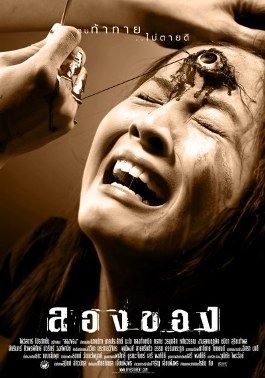
Abb.: Plakat
[Bildquelle: Wikipedia. -- Fair use]
|
Art of the Devil II (Thai: ลองของ) ist ein thailändischer Horrorfilm aus dem Jahr 2005 und nach Art of the Devil (คนเล่นของ) der zweite Teil einer gleichnamigen Filmtrilogie. Regie führte ein Team aus sieben thailändischen Filmemachern, genannt das „Ronin-Team“ โรนินทีม). HandlungTa (ต๊ะ )ist ein schwieriger heranwachsender Schüler, der mit seinem geliebten Vater, den er sehr verehrt, sowie mit seiner Stiefmutter, Aajaan Panor (ครูพนอ), nebst Halbbruder zusammenlebt. Der junge Mann hat starke Vorbehalte gegen die neue Frau an der Seite seines Vaters, die auch sein geschätzter alter Herr nicht aus der Welt schaffen kann. Eines Tages fühlt sich Ta in seiner Meinung bestärkt als er seine attraktive Stiefmutter, selbst Lehrerin an seiner Schule, heimlich beim Liebesakt mit einem tyrannischen Sportpädagogen beobachtet. Den Hinweis gab ihm zuvor sein Jugendfreund Paw (ปอ), ein dubioser Knabe, der rasend vor Eifersucht seine heimliche und viel ältere Liebhaberin, er machte Aajaan zeitlich versetzt mittels dunkler Magie zu seiner Sexsklavin, anonym dem Spott der Öffentlichkeit preisgeben will. Ta kontaktiert seinen Vater, doch entgegen seiner Annahme trennt dieser sich nicht von seiner vermeintlich untreuen Gefährtin, sondern stellt sich vielmehr loyal an die Seite seiner Gemahlin, um ihr bei dem bevorstehenden Skandal beizustehen. Die unschuldige Erzieherin, sie wurde von einer dämonischen Kraft zum Beischlaf mit Paw und dem Sportlehrer gedrängt, wird später der Schule verwiesen, ihre Karriere ist abrupt beendet. Ta ist vom Ehebruch der Schönheit überzeugt, er ahnt nichts von der Rolle Paws im verworrenen Beziehungsgeflecht. Gemeinsam mit fünf seiner Freunde, darunter auch Paw, beschattet er daraufhin den zu Gewalt neigenden Geliebten seiner Stiefmutter. Der Sporttrainer bemerkt allerdings die Clique, und es gelingt ihm bereits nach kurzer Zeit die jungen Leute dingfest zu machen. Anschließend misshandelt der triebhafte Lehrer die Gruppenmitglieder und vergeht sich sexuell an zwei weiblichen Schülerinnen. Die gedemütigten Jugendlichen beschließen sich mit allen erdenklichen Mitteln zu wehren, suchen hierzu jenen dunklen Hexer auf, der mittels Khmer Magie ihren Peiniger verflucht bis dieser einen qualvollen Tod erleidet. Von der Gruppe unbemerkt sucht Paw den Magier heimlich auf und bittet ihn, Aajaan zu verfluchen, damit sie „unvergesslich leidet“. Die mysteriösen Geschehnisse verändert die leidgeprüfte Liebhaberin. Sie verstümmelt sich und bricht seelisch völlig ein, bis sie sich schicksalshaft einer Zauberin anvertraut, die sie vom unheilvollen Bann befreit; sie selbst kann fortan unheilvolle Flüche wirken. Der Beginn eines Rachefeldzuges. Zwei Jahre später treffen sich die sechs Freunde zu einem gemeinsamen Wochenende auf dem Lande. Sie wollen Ta besuchen, der seit dem mysteriösen Selbstmord seines Vaters, mit Aajaan Panor in einem traditionellen Pfahlbau lebt. Die Gruppe erhofft sich alte Zeiten wiederaufleben zu lassen, was anfänglich auch mit dem heiteren Beisammensein gelingt. Kleinere Konflikte werden überspielt, totgeschwiegen oder aber nicht verarbeitet, wie beispielsweise die leidgeprüfte Beziehung Tas zu seiner Jugendliebe Kim (คิ้ม), die ihn einst als Hemmnis für ihr Medizinstudium ansah, sich von ihm loslöste und seitdem mit dem ebenfalls anwesenden Paw liiert ist. Diese Idylle endet jedoch jäh in einem tödlichen Überlebenskampf. Die unheimliche Macht, die Paw einst heraufbeschwor, wendet sich nun in Form der rachsüchtigen Ex-Lehrerin gegen sie. Sie werden fortan vom Bösen gejagt, von Geistern geplagt und der Reihe nach getötet. Das Sterben beginnt. Die Überlebenden kämpfen bald auch mit internen Querelen, der notwendige Zusammenhalt im Kampf gegen die dunklen Flüche schwindet. Die Rächerin hat so leichtes Spiel mit ihren Opfern. Der eingeschüchterte Paw, den die Ex-Lehrerin foltert, klärt seine zwei verbliebenen Gefährten über die Geschehnisse der jüngeren Vergangenheit auf, bis er einen grausamen Foltertod erleidet. Er ist für den Niedergang Tas Familie verantwortlich und Zugleich der Initiator der Mordserie. Wenige Augenblicke später stürmt die Polizei das Anwesen, tötet die Rächerin und befreit Kim und Ta. Am Ende des Films erwacht die Studentin im Krankenbett an der Seite ihres Ex-Freundes Ta. Dieser entpuppt sich als längst verstorbener Geist, der aufgrund eines jugendlichen Wettstreits – Kim buhlte einst um die Gunst des Jungen, bemächtigte sich fataler Weise dunklen Magie – nicht loslassen kann, da er bis ans Lebensende an sie gebunden ist. In der letzten Szene tötet er seine Gefährtin, so dass letztlich alle Jugendlichen, die einst Magie anwendeten sterben! Besetzung
Die Filmzeitschrift VideoWoche betitelt die ‚Ich weiß, was du letzten Sommer getan hast‘-Variante als „einen der blutigsten fernöstlichen Gruselschocker seit langem.“ Detailfreudige Großaufnahmen, in denen „Leiber geschunden und Menschen kulinarisch verwertet“ werden untergraben diese These. Ferner kommt man zu der Überzeugung, dass „alles gut gespielt“ sei und „handwerklich versiert“ vorgetragen werde. Kurzum: „Ein Tipp für hartgesottene Genrefreunde, dem sein Ruf in der Szene voraus eilt.“ [1]" [Quelle: http://de.wikipedia.org/wiki/Art_of_the_Devil_II. -- Zugriff am 2013-03-22] |
2005-12-04

Ins seiner Geburtstagsrede bekennt sich König Bhumibol dazu, dass man ihn kritisieren darf:
"If someone offers criticisms suggesting that the King is wrong, then I would like to be informed of their opinion. If we hold that the King cannot be criticised or violated, then the King ends up in a difficult situation. Saying that the King can do no wrong is an insult to the King, as it shows the speaker does not regard the King as a human being. Actually I want criticism. I have to know if people agree or disagree with me when I'm doing things. [Regarding those who violate Thailand's lese-majeste law] if they get sent to prison, I pardon them. If they don't go to prison, I won't sue them, because those who rebel against the King and are punished are not the ones who are in trouble. It would be the King who was in trouble. It is strange, but the lawyers like to send people to prison [for allegedly criticising the King]." [Übersetzt in: Chronicle of Thailand : headline news since 1946 / ed. in chief Nicholas Grossman. -- Bangkok : Bangkok Post, 2010. -- ISBN 978-981-4217-12-5.]
2005-12-10
Eröffnung des Siam Paragon (สยามพารากอน) Einkaufszentrums in Bangkok. Baukosten 15 Milliarden Baht.
Abb.: Lage des Siam Paragon (สยามพารากอน)
[Bildquelle: OpenStreetMap. -- Creative Commons Lizenz (Namensnennung, share alike)]
Abb.: Siam Paragon (สยามพารากอน), 2008
[Bildquelle: Tun Tun Win. -- http://www.flickr.com/photos/tuntunwin/2317551533/. -- Zugriff am 2012-04-26. -- Creative Commons Lizenz (Namensnennung)]
Abb.: Siam Paragon (สยามพารากอน)
[Bildquelle: ©Google earth. -- Zugriff am 2012-01-07]
"Das Siam Paragon ist ein Einkaufszentrum im Stadtteil Pathum Wan (ปทุมวัน) von Bangkok, Thailand. Es hat den Beinamen „The Pride Of Bangkok“. Allgemeine Informationen
Das Siam Paragon befindet sich an der Stelle des ehemaligen Siam Intercontinental Hotels. Das Gelände gehört dem Crown Property Bureau (สำนักงานทรัพย์สินส่วนพระมหากษัตริย์) und war einst ein königlicher Park des nahe gelegenen Sra-Pathum-Palasts (วังสระปทุม, Lotusweiher-Palast). Eröffnet wurde es nach drei Jahren Bauzeit mit einer großen Feier am 9. Dezember 2005 und ist damit das neueste Einkaufszentrum seiner Art in Bangkok. Die Baukosten beliefen sich auf 15 Mrd. Baht (309 Mio. Euro, Stand Dezember 2005). Neben dem Emporium Shopping Center in der Sukhumvit Road gilt es als das exklusivste Einkaufsparadies in Bangkok. Die Leitung der Einrichtung obliegt einem Joint Venture von The Mall Group (managt auch das Emporium) und Bangkok Intercontinental Hotels Co. (Thailand).
[...]
EinrichtungenAuf 500.000 Quadratmetern finden sich zahllose Geschäfte und Boutiquen sowie das Kaufhaus Siam Paragon Departmentstore. Nahezu jede bekannte Luxus-Marke, egal aus welchem Teil der Welt, wird hier angeboten. Besucher und Touristen aus anderen asiatischen Ländern, vornehmlich Japan und Hong Kong, kommen gern nach Bangkok um Luxusartikel namhafter Hersteller zu erstehen. Diese sind in Thailand meist wesentlich günstiger.
Im Siam Paragon gibt es 16 Kinos, 52 Bowlingbahnen und ein Fitness-Studio.
Mit der Royal Paragon Hall verfügt es über ein komplettes Messe- und Veranstaltungszentrum mit drei Messehallen, fünf Räumen für Meetings, Businesscenter und einer VIP-Lounge.
In den zwei Untergeschossen befindet sich die Siam Ocean World. Dieses Aquarium beherbergt über 30.000 Tiere, ein künstlich angelegtes Riff sowie ein Haifischbecken."
[Quelle: http://de.wikipedia.org/wiki/Siam_Paragon. -- Zugriff am 2012-01-07]
2005-12-12 - 2005-12-14

ASEAN-Gipfeltreffen in Kuala Lumpur (Malaysia). Motto: "One Vision, One Identity, One Community". Myanmar wird zu demokratischen Reformen und zur Freilassung politischer Häftlinge aufgefordert.
Am 14.12. erster Ostasiatischer Gipfel: die ASEAN hat dazu die VR China, Japan, Indien, Südkorea, Australien und Neuseeland eingeladen: Russland nimmt als Beobachter teil. Es wird die Grundlage gelegt für eine asiatische Wirtschaftsgemeinschaft.
Abb.: Lage von Kuala Lumpur (Malaysia)
[Bildquelle: OpenStreetMap. -- Creative Commons Lizenz (Namensnennung, share alike)]
Abb.: Teilnehmer am East Asia Summit 2005
[Bildquelle: Mangwanani / Wikimedia. -- GNU FDLicense]
"The East Asia Summit (EAS) is a pan-Asia forum held annually by the leaders of 16 countries in the East Asian region. EAS meetings are held after annual ASEAN leaders’ meetings. First summit
The first summit was held in Kuala Lumpur, Malaysia on December 14, 2005. The 16 countries and 1 observer involved were:
observer
- John Howard, Prime Minister of Australia
- Hassanal Bolkiah, Sultan & Prime Minister of Brunei
- Hun Sen (ហ៊ុន សែន), Prime Minister of Cambodia
- Wen Jiabao (温家宝), Premier of China
- Manmohan Singh (ਮਨਮੋਹਨ ਸਿੰਘ), Prime Minister of India
- Susilo Bambang Yudhoyono, President of Indonesia
- Junichiro Koizumi (小泉 純一郎), Prime Minister of Japan
- Bounnhang Vorachith (ບຸນຍັງ ວໍລະຈິດ), Prime Minister of Laos
- Abdullah Ahmad Badawi, Prime Minister of Malaysia, (Chairperson)
- Soe Win (စိုးဝင်း), Prime Minister of Burma
- Helen Clark, Prime Minister of New Zealand
- Gloria Macapagal-Arroyo, President of the Philippines
- Lee Hsien Loong (李顯龍), Prime Minister of Singapore
- Roh Moo-hyun (노무현), President of South Korea
- Thaksin Shinawatra (ทักษิณ ชินวัตร), Prime Minister of Thailand
- Phan Văn Khải, Prime Minister of Vietnam
Issues relating to the first EAS
- Vladimir Putin (Влади́мир Влади́мирович Пу́тин), President of Russia
The presence of non-East Asian countries
While India is included in Asia it is normally identified as part of South Asia not East Asia. Australia and New Zealand are usually included in Oceania rather than Asia, although some differ and the distinction can be unclear, and they may be seen as part of the Asia Pacific.
The involvement of countries not seen as traditionally part of East Asia, especially Australia and New Zealand but to a lesser extent India as well, was seen as controversial by some. The inclusion of Australia and New Zealand was considered problematic as these nations were said to be neither geographically nor culturally part of Asia. Former Malaysian Prime Minister Mahathir bin Mohamad, credited with raising the idea of an East Asian caucus, was especially critical of the involvement of Australia and New Zealand.[1]
Australia's presence was only confirmed after Australia reversed its previous policy and agreed to accede to ASEAN's Treaty of Amity and Cooperation in Southeast Asia.
The presence of India was met by "quiet resistance" from China. This stance may have reflected, in part, the perception that the presence of India would act to lessen Chinese influence in the EAS, as discussed further below.
Although not strictly East Asian all three countries did have a notable history with ASEAN. In 1974 Australia became ASEAN's first dialogue partner. New Zealand became a dialogue partner in the following year, 1975. Summits with ASEAN for both countries were first held in 1977.
It has been suggested that the final membership of the EAS represents an "anti-region", supplied in order to prevent the emergence of a regional community in Asian East Asia, rather than a region.
Australia and New Zealand as the two Closer Economic Relations (CER) countries have also developed close ties with ASEAN and have been negotiating a CER-ASEAN free trade agreement since 2004.
The linkages between ASEAN and India are more recent. India did not become a full ASEAN dialogue partner until 1995. Nevertheless India's "look East" policy has placed particular emphasis on building relationships in the Asian region.
Koizumi's Visits to the Yasukuni Shrine (靖国神社)Japan-China and Japan-South Korea ties were strained ahead of the first Summit because of Japanese Prime Minister Junichiro Koizumi controversial visits to the Yasukuni shrine, which honors 14 war criminals alongside Japan's other fallen soldiers. These visits are perceived by China and South Korea as symptomatic of a Japan that has not come to terms with its role in World War II, a conclusion disputed by Japan.
The most recent (at the time) visit by Prime Minister Koizumi was on 17 October 2005, so the issue was still fresh by the EAS in December. As a result the traditional Japan-China-South Korea meeting on the sidelines of the ASEAN Plus Three meeting (which preceded the EAS) was cancelled by China and South Korea.
The rise of China and the need to check Chinese influenceThe presence of the non-East Asian India, and to a lesser extent Australia and New Zealand, was seen by some as an attempt by some members of ASEAN (such as Singapore, Indonesia and the Philippines) to include countries who by their size or economies may act as a check to the rising influence of China, especially as the weakness in Sino-Japanese relations undermined the ability of Japan to perform that role.
China has attributed the presence of Australia and India to Japanese influence.
The absence of the United States of AmericaThe absence of the United States of America was seen by some commentators as symptomatic of what was said to be the USA's declining influence in Asia.
Some view this as linked with what is perceived as Chinese influence rising.
Outcome of the first EASThe difficulties in the relationship between the "Plus Three" members (i.e. Japan, China and South Korea) of ASEAN Plus three together with the positioning of parties due to the presence of the non-East Asian countries, India, Australia and New Zealand, resulted in limitations in what could be achieved at the inaugural EAS. The role of the inaugural EAS then became a confidence building and familiarisation exercise.
The Kuala Lumpur declaration and the Avian Influenza Prevention, Control and Response declaration were signed by the 16 leaders during the first EAS.
It was agreed to hold future EASs in conjunction with the annual ASEAN meetings.
The outcomes that were achieved are summarised in the Chairman’s Statement of the First East Asia Summit."
[Quelle: http://en.wikipedia.org/wiki/First_EAS. -- Zugriff am 2012-01-21]
2005-12-13
Inbetriebnahme des Meeres-Glasfaser-Kabelsystems SEA-ME-WE 4 (South East Asia–Middle East–Western Europe 4)
Abb.: Verlauf von SEA-ME-WE 4
[Bildquelle: J. P. Lon / Wikipedia. -- GNU FDLicense]
2005-12-23

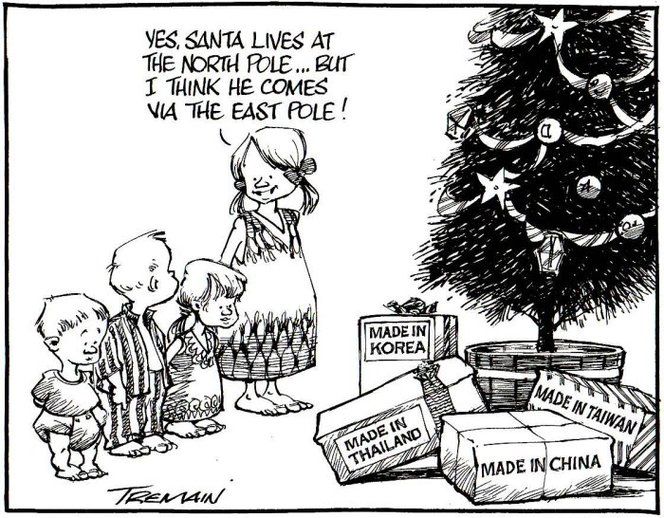
Abb.: "Yes Santa lives at the
North Pole ... but I think he comes via the East Pole", Neuseeland, 2005-12-23
[Bildquelle: "Yes, Santa lives at the North
Pole... But I think he comes via the East Pole!" 23 December, 2005.. Tremain,
Garrick, 1941-:[Includes all digital cartoons published in the Otago Daily Times
from 25 July 2005 onwards plus a selection from December 2004 to July 2005].
Ref: DCDL-0000605. Alexander Turnbull Library, Wellington, New Zealand.
http://natlib.govt.nz/records/22759711. -- Zugriff
am 2013-03-15. -- "You can copy this item for personal use, share it, and post
it on a blog or website. It cannot be used commercially without permission"]
2005-12-24
Thailand-Premiere des Films Innocence (เด็กโต๋, or Dek To) von Areeya Chumsai (อารียา ชุมสาย, 1971 - ) und Nisa Kongsri (นิสา คงศรี)
Abb.: DVD-Cover
"Innocence (Thai: เด็กโต๋, or Dek To), is a 2005 Thai independent documentary film directed by Areeya Chumsai (อารียา ชุมสาย, 1971 - ) and Nisa Kongsri (นิสา คงศรี) about a boarding school for hill tribe children in Chiang Mai Province (เชียงใหม่), Thailand. The film had its world premiere at the 2005 Pusan International Film Festival (부산국제영화제).[1]
SummaryShot on digital video, the documentary tells the story of Prayoon Kamchai (ประยูร คำชัย), principal of the Baan Mae Toh school (โรงเรียนบ้านแม่โต๋) in rural, mountainous Chiang Mai Province. Faced with poor families of hill tribe (mostly Karen - กะเหรี่ยง - and Hmong - แม้ว) subsistence farmers and rugged terrain, Prayoon sought to find a way to ensure children in his far-flung school district received a proper education. Children would often have to travel 80 to 90 kilometers on narrow, winding mountain roads, which in the rainy season became impassable, to get to school. Often, children's parents were too poor to afford tuition.
Abb.: Lage von Baan Mae Toh (นบ้านแม่โต๋)
[Bildquelle: OpenStreetMap. -- Creative Commons Lizenz (Namensnennung, share alike)]Prayoon, who asked to be assigned to the school when he started teaching in 1983, at first noticed the children had no food, so he decided to start a free lunch program. He then solved the problem of transportation by creating a boarding school and finding a way for as many children to attend as the school could accept.
The school receives a small amount of funds from the Thai government. Building supplies for the boarding school dorms were donated, and much of the building work and other improvements at the school were made by the students and teachers themselves. To supplement the small meal allowance from the government, the students raise their own vegetable crops and livestock.
Baan Mae Toh school offers classes up to Mattayom 3 (มัธยม ๓), or ninth grade. As a reward for graduating from the school, Prayoon arranges for the class to take a trip to the beach in Prachuap Khiri Khan Province (ประจวบคีรีขันธ์), a trip of more than 1,000 kilometers that takes three days, by truck and bus. For all the children, it is the first time they will see the ocean. Along the way, the children stay at Buddhist temples for free to keep the cost of the journey low.
ProductionProducer-director Areeya Chumsai is a Thai-American model who was Miss Thailand Universe 1994. She then moved to Thailand permanently, became an officer in the Royal Thai Army and taught English at the army's military academy, as well as writing magazine columns and books. Co-director, principal cinematographer and editor Nisa Kongsri had worked as an assistant director, working on such films as Siam Renaissance and One Night Husband (คืนไร้เงา). Phanjanit Garnploog produced and edited an international version of the film. Areeya, wanting to research her idea for a film about hill tribe children, contacted Nisa for help. The two formed a partnership and developed a screenplay for Innocence, which was selected for presentation at the 2003 Pusan International Film Festival.
ReceptionImpact
When Innocence was released, the Thai government had made cuts to its education budget, reducing student meal allowances from 20 baht a day to 12 baht. Coverage of the film in the Thai media brought attention to the issue and the government rescinded the cuts.[2] Proceeds from the film and a fund-raising campaign have also gone to support the school.
Critical receptionKong Rithdee of the Bangkok Post mentioned Innocence in his recap of Thai films released in 2005, saying the documentary supplied "meaty stuff to the multiplexes usually swamped with feature films ... [it helped] pry open the door for the release of alternative cinema and refreshed the audience's perception that documentaries do deserve a space on the big screen.".[3]
Festivals and awardsThe film had its world premiere at the Pusan International Film Festival, where it was screened in the "Wide Angle" program.[1] It then had a limited run in Bangkok cinemas, and was also screened at the 2006 Bangkok International Film Festival. At the CineMekong Film Festival, organized by the Alliance française in Phnom Penh, it was awarded the Prix de la Diversite Culturelle. The film was then screened at the EBS International Documentary Festival in Seoul, where it won the Spirit Award. In November 2006, the filmmakers did a tour of film festivals in Europe, screening Innocence at the Lyon Asian Film Festival, the International Film Festival for Children and Youth in Madrid and the Festival des 3 Continents in Nantes."
[Quelle: http://en.wikipedia.org/wiki/Innocence_%282005_film%29. -- Zugriff am 2012-06-07]
2005-12-26
Gedenkfeiern für die Opfer der Tsunami-Katastrophe vom 2004-12-26.
2005-12-27

Die Separatisten von Aceh entwaffnen ihre Terroristen. Damit erfüllen sie das Friedensabkommen von Helsinki vom 15. August 2005 (siehe oben!).
ausführlich: http://www.payer.de/thailandchronik/ressourcen.htm
Zu Chronik 2006 / B. E. 2549. -- 1. undatiert